Missouri Documents
Quitclaim Deed
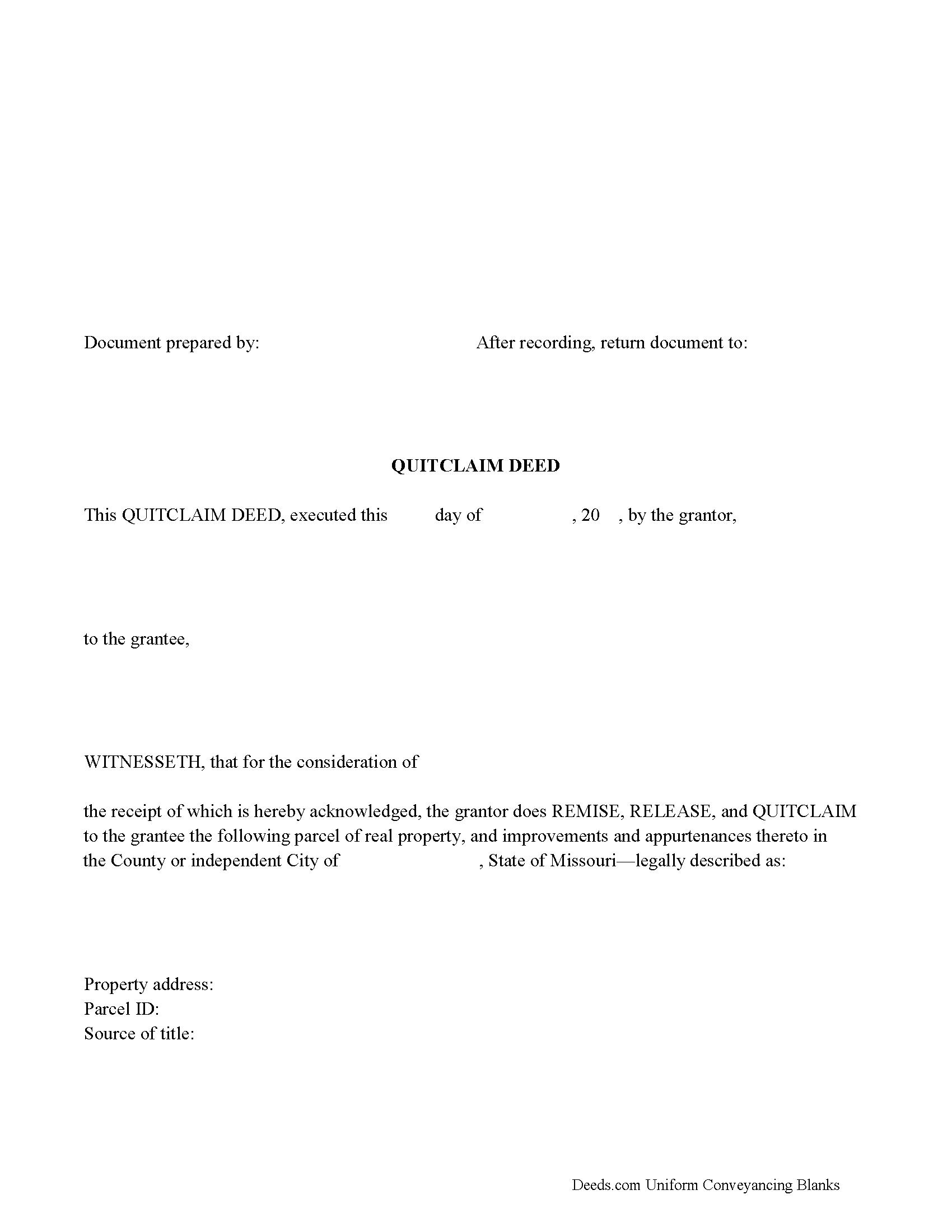
Real property transfers are governed by Chapter 442 of the Missouri Revised Statutes. Quitclaim deeds, however, are not specifically defined in the statutes.
(Missouri QD Package includes form, guidelines, and completed example)
Quitclaim deeds are used to transfer the rights, title, and interest in real estate from the grantor (seller) to the grantee (buyer) without any warranty of title. When using a quitclaim deed, there may be potential unknown claims or restrictions on the title, and the buyer accepts the risk, effectively taking the title as-is.
These deeds are frequently used in instances such as a divorce, with one spouse signing all of his or her rights in a piece of real property over to the other spouse; when there is uncertainty about the history of the property's title; or when a current owner or buyer wishes another party with interest in the property to disclaim that interest.
A lawful quitclaim deed includes the names and addresses of each grantor and grantee, and a complete legal description of the property (59.310, RSMo). Include the preparer's name, address, and signature as well. Besides these requirements, the form must meet all state and local st... More Information about the Missouri Quitclaim Deed
Gift Deed
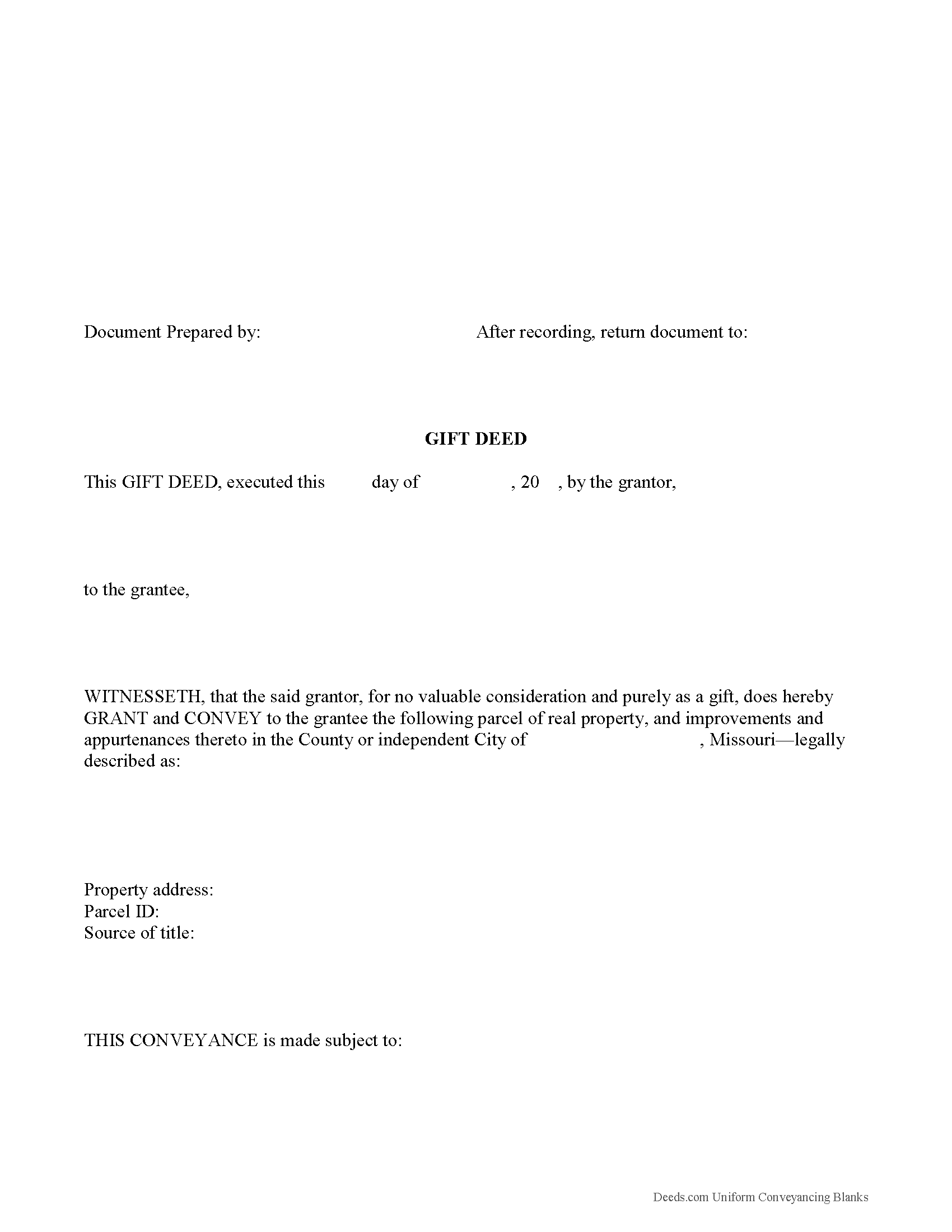
A gift deed, or deed of gift, is a legal document voluntarily transferring title to real property from one party (the grantor or donor) to another (the grantee or donee). A gift deed typically transfers real property between family or close friends. Gift deeds are also used to donate to a non-profit organization or charity. The deed serves as proof that the transfer is indeed a gift and without consideration (any conditions or form of compensation).
Valid deeds must meet the following requirements: The grantor must intend to make a present gift of the property, the grantor must deliver the property to the grantee, and the grantee must accept the gift. Gift deeds must contain language that explicitly states no consideration is expected or required, because any ambiguity or reference to consideration can make the deed contestable in court. A promise to transfer ownership in the future is not a gift, and any deed that does not immediately transfer the interest in the property, or meet any of the aforementioned requirements, can be revoked [1].
A lawful gift deed must also include the grantor's full name and marital status, as well as the grantee's full name, marital status, m... More Information about the Missouri Gift Deed
Warranty Deed
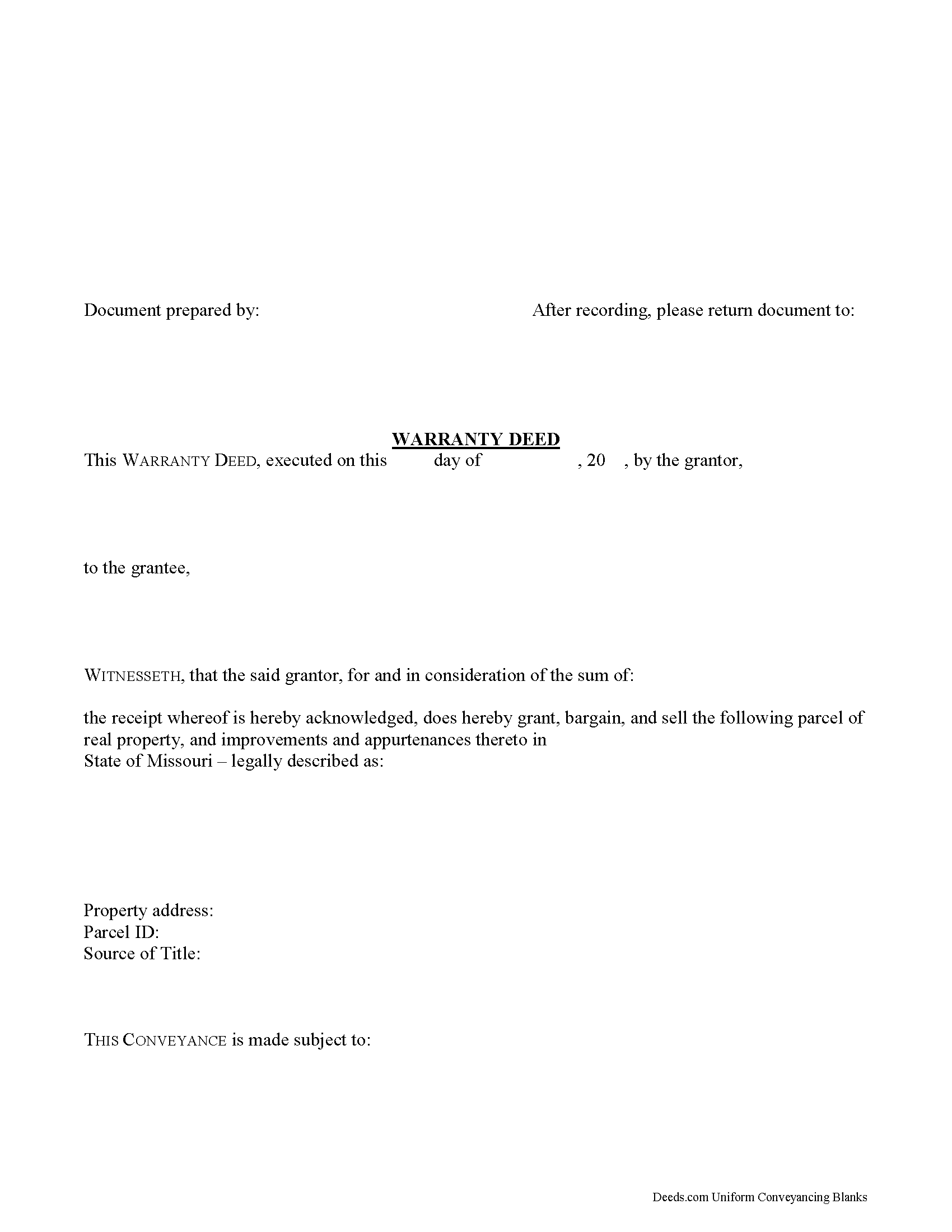
A warranty deed can be used in Missouri to convey title to real property. Missouri does not offer a statutory form for a warranty deed. In a duly executed warranty deed, the following covenants are generally included: covenant of seisin, power to sell, freedom from encumbrances, quiet enjoyment, and warranty of title. A warranty deed in Missouri will pass the after-acquired title of the grantor and will be effective as if the legal estate had been in the grantor's possession at the time of conveyance (442.430). The grantor in a warranty deed warrants the title against the acts of all others.
A warranty deed needs to be signed by the party granting the conveyance and should be acknowledged or proved and certified in the manner prescribed by Missouri Statutes. However, all parties are required to sign if the deed is being recorded in the City of St. Louis. For warranty deeds acknowledged or proved within Missouri, the proof or acknowledgement can be taken before a court having seal or a judge, justice or clerk of such court, or by a notary public. If the acknowledgment or proof of a warranty deed is taken outside of Missouri but within the United States, it can be done before any... More Information about the Missouri Warranty Deed
Special Warranty Deed
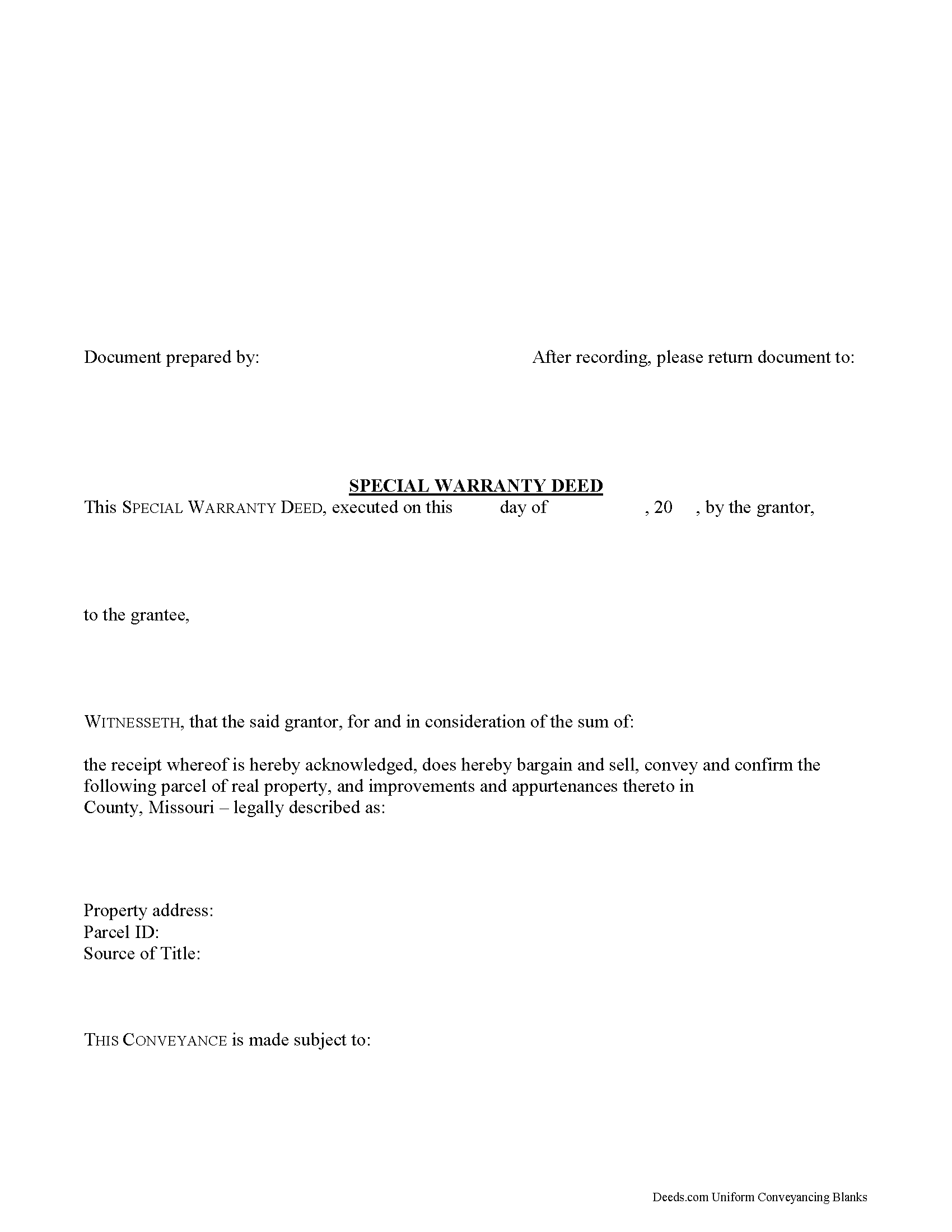
A special warranty deed can be used in Missouri to transfer title to real property. This type of deed does not offer as much protection as a warranty deed. A special warranty deed includes a covenant that the land is free of any encumbrances done or suffered by the grantor and that the grantor will defend the title against the claims and demands of those claiming by, through, or under the grantor.
A special warranty deed needs to be signed by the party granting the conveyance and should be acknowledged or proved and certified in the manner prescribed by Missouri Statutes. However, all parties are required to sign if the deed is being recorded in the City of St. Louis. For special warranty deeds acknowledged or proved within Missouri, the proof or acknowledgement can be taken before a court having seal or a judge, justice or clerk of such court, or by a notary public. If the acknowledgment or proof of a deed is taken outside of Missouri but within the United States, it can be done before any of the officers listed in 442.150 of the Missouri Statutes (442.150). The officer taking acknowledgements should have a certificate of acknowledgment or proof endorsed on the deed (442.180).... More Information about the Missouri Special Warranty Deed
Grant Deed
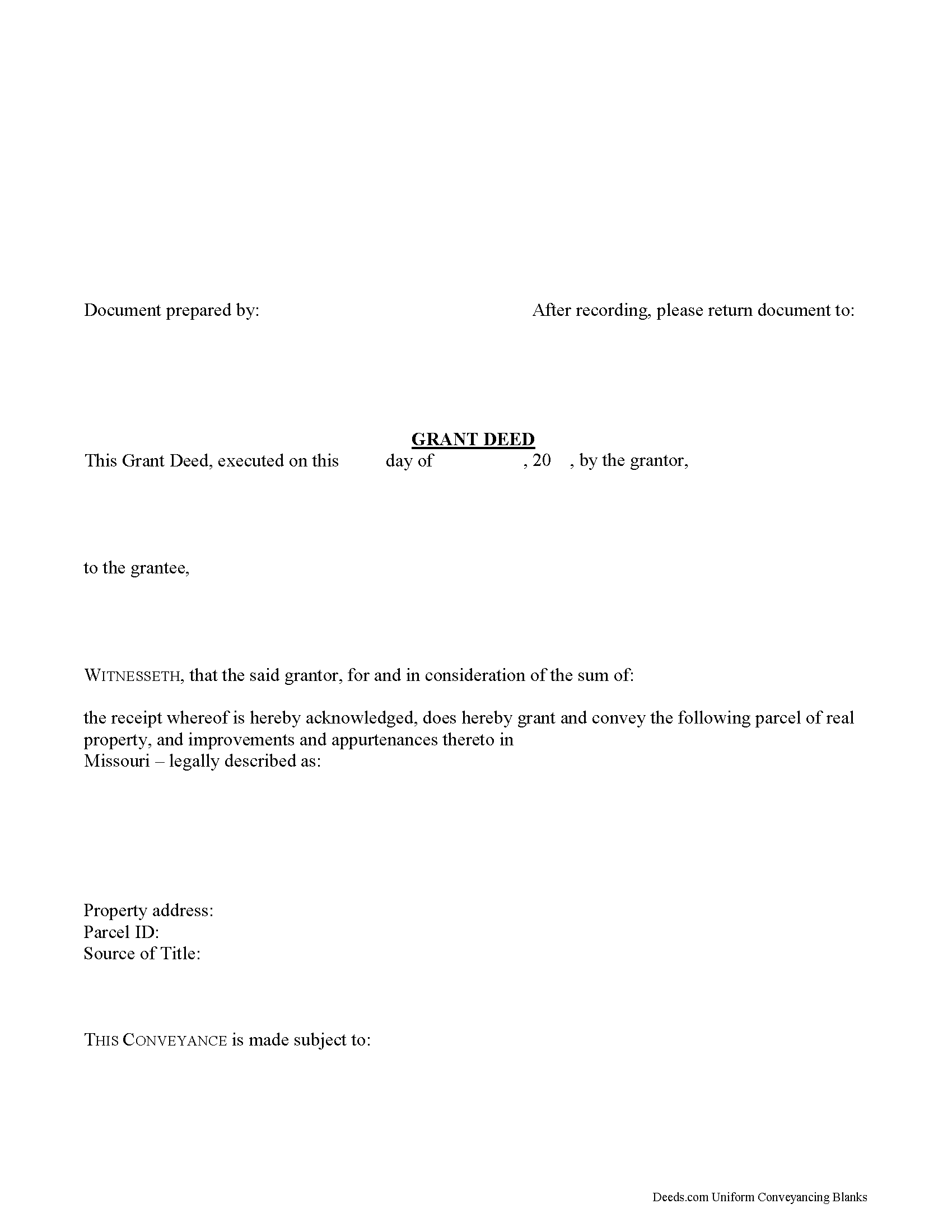
A grant deed in Missouri can be used to convey real property. The words "grant, bargain, and sell," when used in a conveyance, are construed to include the following expressed covenants from the grantor to the grantee: (1) That the grantor was, at the time of execution of the conveyance, seized of an indefeasible estate in fee simple of the premises being granted, (2) That such real estate was, at the time of execution of the conveyance, free from encumbrances done or suffered by the grantor or any person under whom he claims, and (3) For further assurances of such real estate to be made by the grantor and his heirs to the grantee and his heirs and assigns (442.420). Grant deeds will pass the after-acquired title of the grantor unless a different intention is expressed in the deed (442.430).
A conveyance of land by grant deed should be executed in writing, signed by the grantor, and acknowledged or proved in the manner prescribed by Missouri Revised Statutes. Grant deeds recorded in St. Louis City should be signed by all parties. The officer taking acknowledgements or proof should have a certificate of acknowledgment or proof endorsed on the deed (442.180).Grant deeds that are a... More Information about the Missouri Grant Deed
Easement Deed
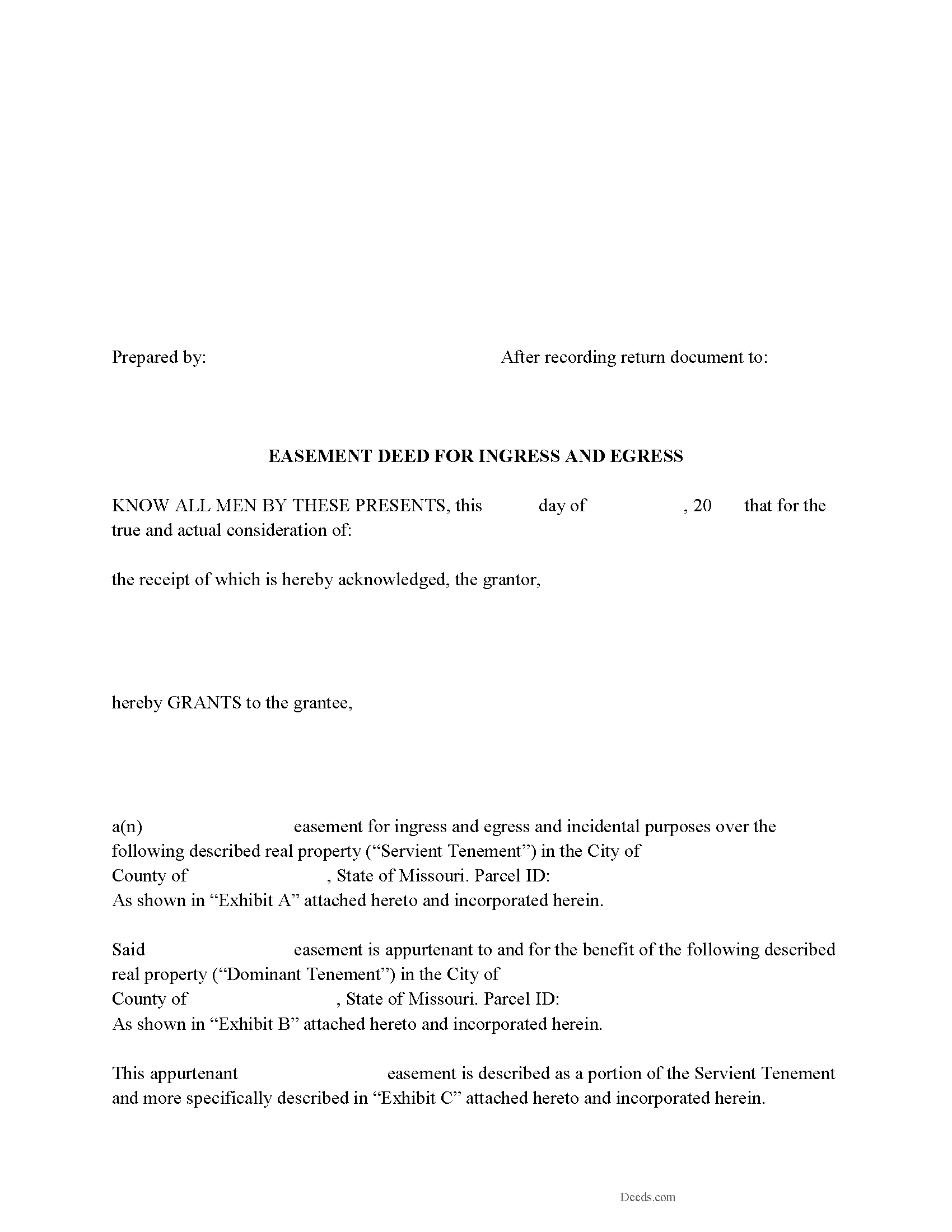
An easement is the right to use another person's real property for a specific purpose. This is a property interest, but is non-ownership and non-possessory. An easement can be created to benefit a dominant estate and run with the land, or it can benefit an individual or legal entity. Easements are affirmative or negative in nature. The rights created by an easement are contained in an easement deed, which should specify the terms and duration of the agreement.
An easement obtained for the purpose of construction, reconstruction, acquisition, or remodeling of a solar energy devise is required to be created in writing and is subject to the same conveyancing and recording requirements as other easements in this state. This type of easement is considered to be negative and cannot be acquired by prescription (442.012). Conservation easements are also created, assigned, conveyed, recorded, released, modified, terminated, or otherwise altered in the same manner as other easements (442.014). Conservation easements are not appurtenant to an interest in real property.
In order to be eligible for recording, an easement deed should be signed by the party granting the easement and should... More Information about the Missouri Easement Deed
Termination of Easement
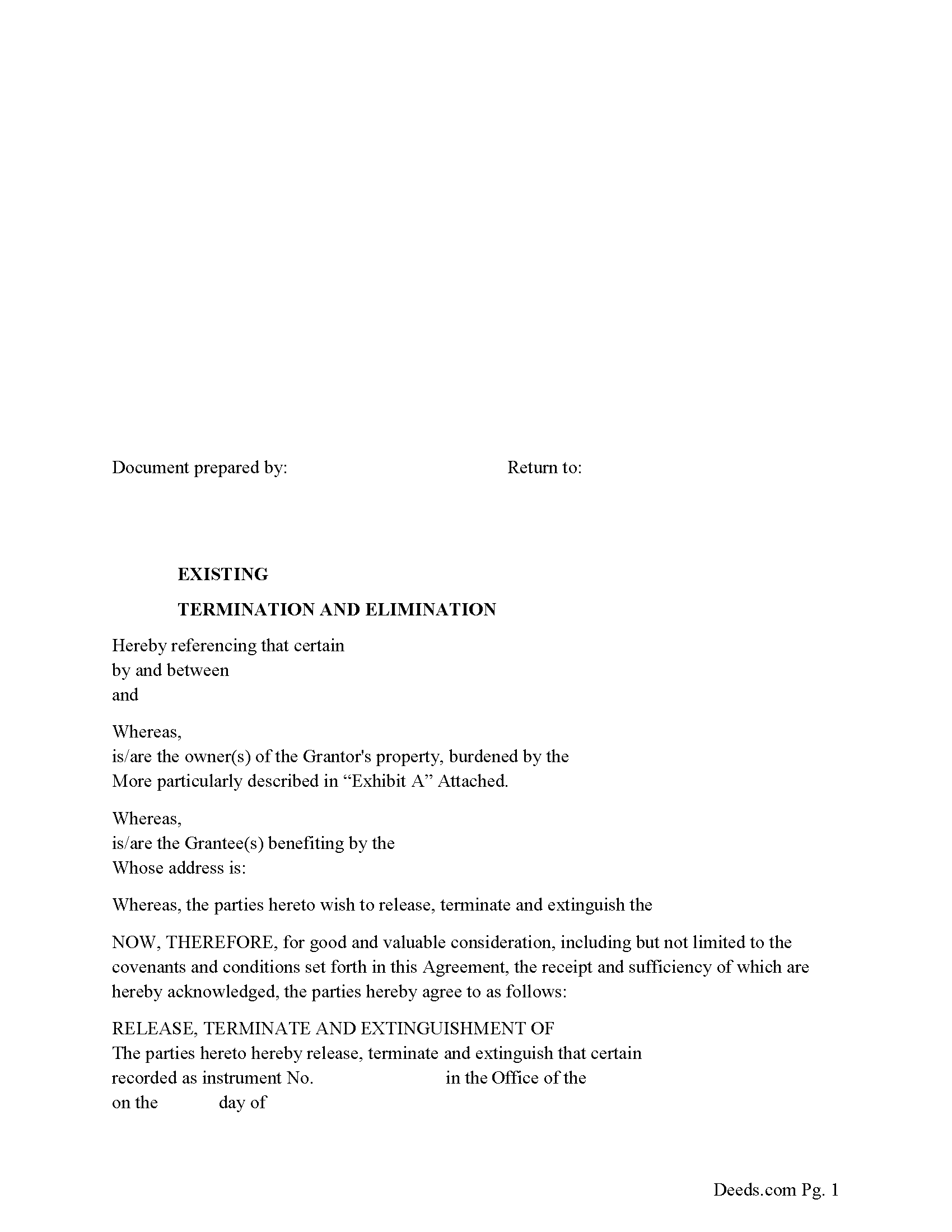
Use this form to release, terminate, extinguish a previously recorded document that involves access to and from a property.
Documents such as:
1. Easement Deeds or Agreements (An easement is a non-possessory interest in land, granting the right to use someone else's property for a specific purpose, like a driveway or utility line)
2. Access Roads
3. Right of Ways
4. Utility Easements (Power, Gas, Water, Sewer, Etc.)
5. Drainage Easements
This document allows the owner of the land, burdened by the access and the party that benefits from the access, to sign an agreement releasing the property from such access, ... More Information about the Missouri Termination of Easement
Correction Deed
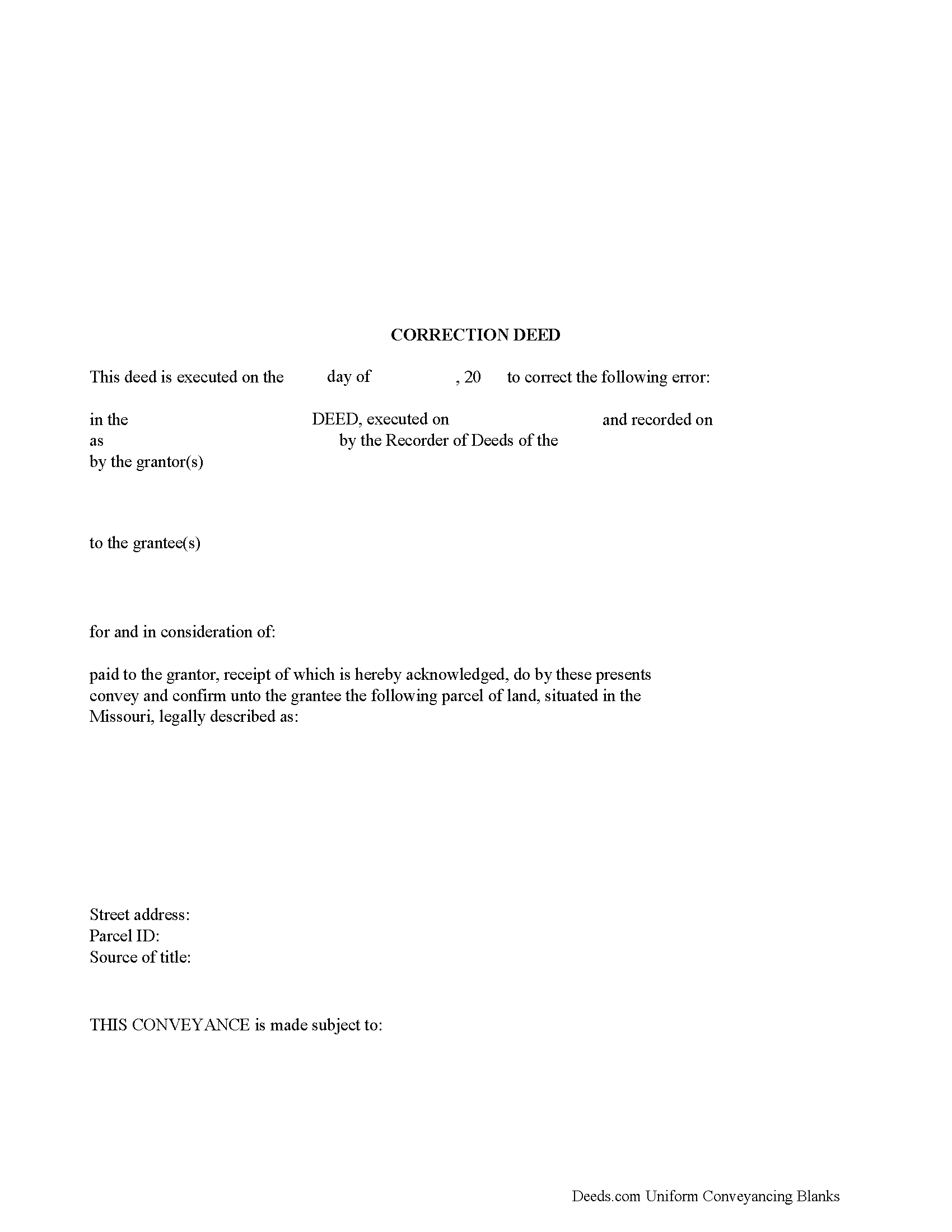
Use the correction deed to correct an error in a warranty, special warranty, conveyance, or quitclaim deed in Missouri.
A corrective deed is in effect an explanation and correction of an error in a prior instrument. As such, it passes no title, but only reiterates and confirms the prior conveyance. It should be executed from the original grantor to the original grantee, and it needs to be recorded in order to be legally valid.
The correction deed must reference the original conveyance it is correcting by type of error, date of execution and recording, and recording number and location. Beyond that, it restates the information given in the prior deed, thus serving as its de facto replacement. The prior deed, however, which constitutes the actual conveyance of title, remains on record.
Deeds of correction are most appropriate for minor errors and omissions in the original deed, such as misspelled names, omission of marital status, or typos in the legal description. More substantial changes, such as adding a name to the title, changing the vesting information or the legal description of the property, require a new deed of conveyance instead of a confirmatory deed.
(Misso... More Information about the Missouri Correction Deed
General Power of Attorney-Durable
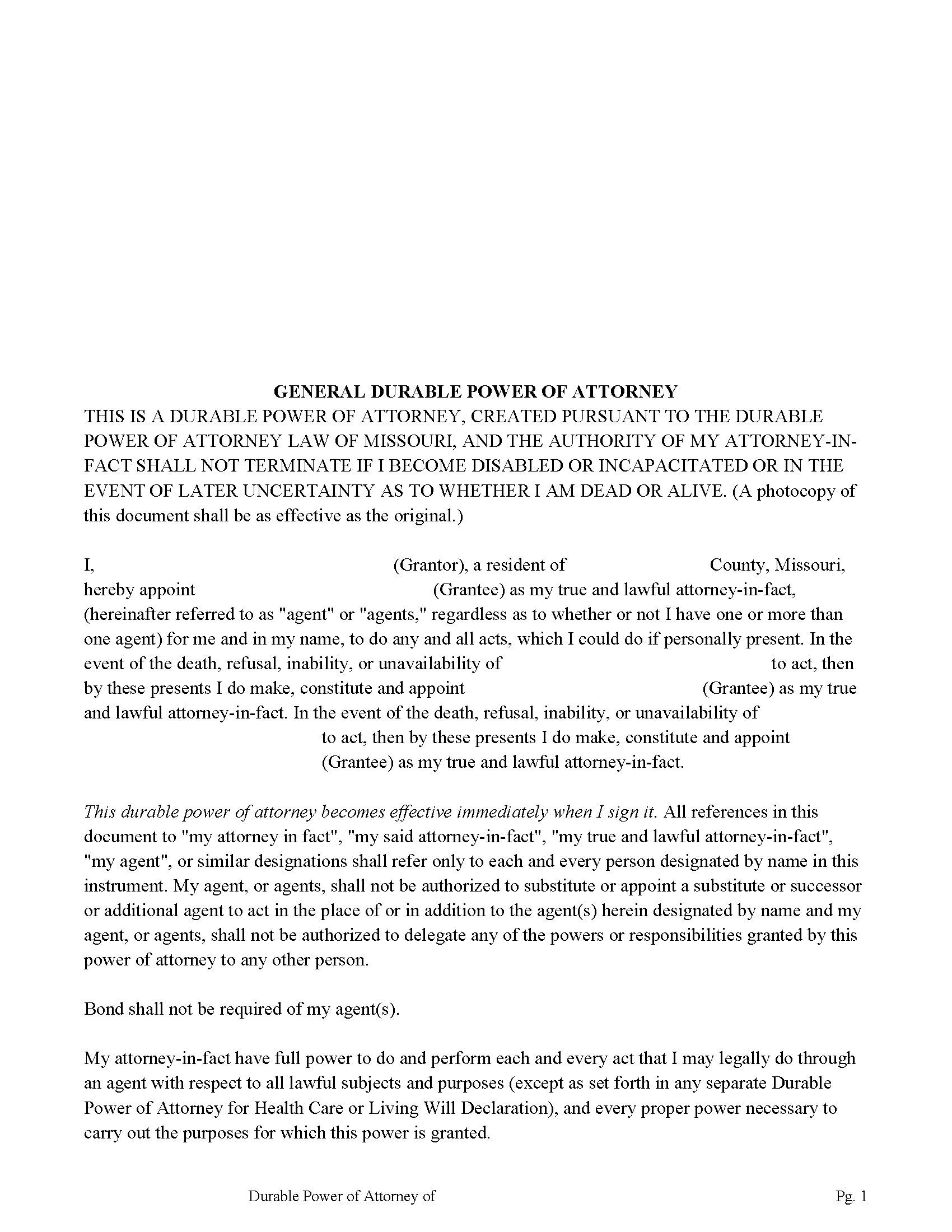
This is a general durable power of attorney, created pursuant to the durable power of attorney law of Missouri, and the authority of your attorney-in-fact shall not terminate if you become disabled or incapacitated.
The principal delegates to an appointed attorney in fact, (general powers to act in a fiduciary capacity on the principal's behalf with respect to all lawful subjects and purposes or with respect to one or more express subjects or purposes.) 404.710. 1.
The principal has the choice of choosing one of more successor agents, in the event that the agent can't or won't act.
Your agent shall not have the authority to do any of the following acts:
1) To make, execute, modify or revoke a living will declaration for you;
2) To require you, against your will, to take any action or to refrain from taking any action;
3) To make, publish, declare, amend or revoke a will for you;
4) To carry out any actions which were specifically forbidden by you while you were not under any disability or incapacity.
In the event an agent named is your spouse, then that appointment and power shall automatically cease on the date any petition for divorce is filed by either of you ag... More Information about the Missouri General Power of Attorney-Durable
Specific Power of Attorney for the Purchase of Property
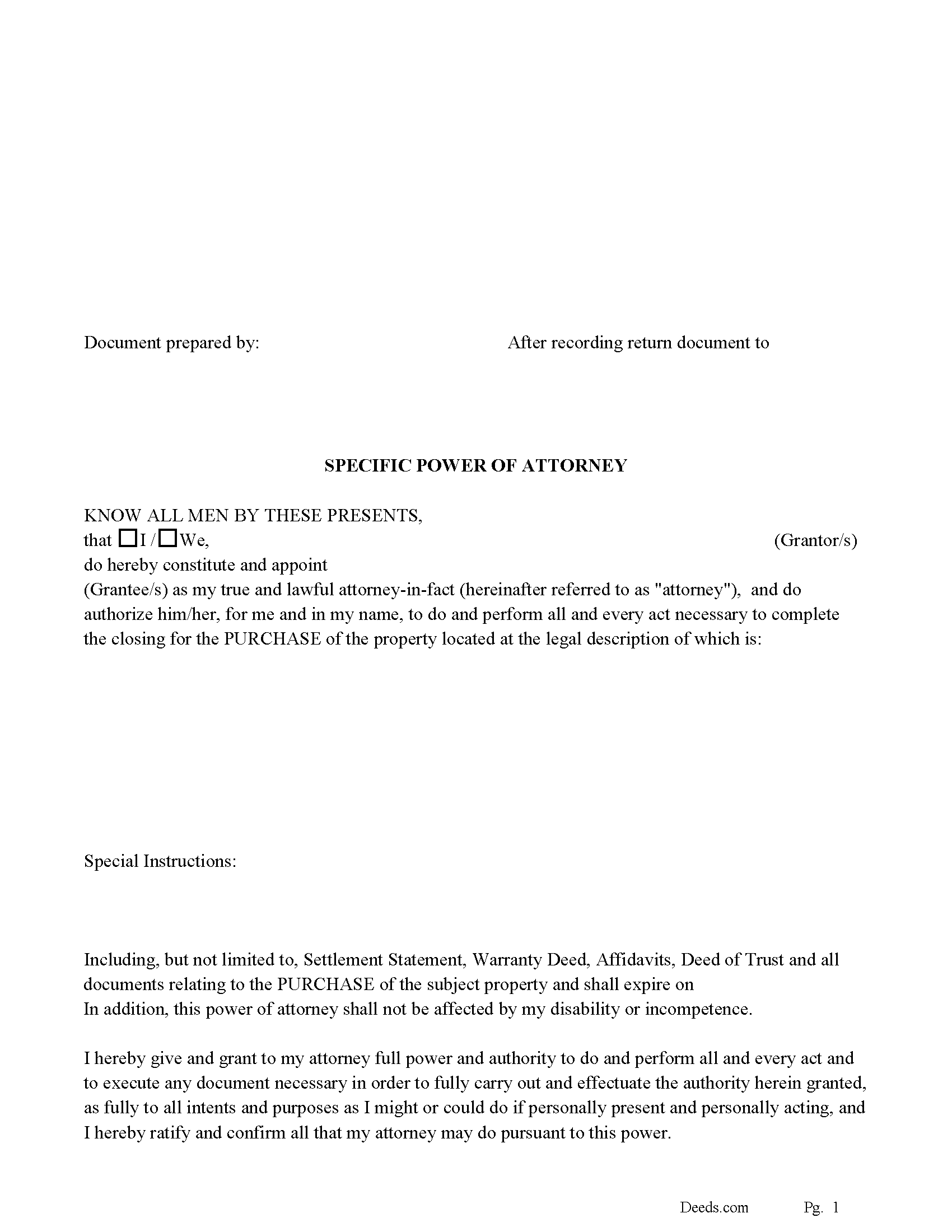
Use this form to authorize an attorney-in-fact to do and perform all and every act necessary to complete the closing for the PURCHASE of a specific property. This form expires on a date of your choice and includes a "Special Instructions" section in which you can further limit or define the powers granted by you to your attorney-in-fact.
This POA is durable and shall not be affected by your disability or incompetence.
For use when the subject property is located in Missouri.
(Missouri SPOA-Purchase Package includes form, guidelines, and completed example)... More Information about the Missouri Specific Power of Attorney for the Purchase of Property
Specific Power of Attorney for the Sale of Property
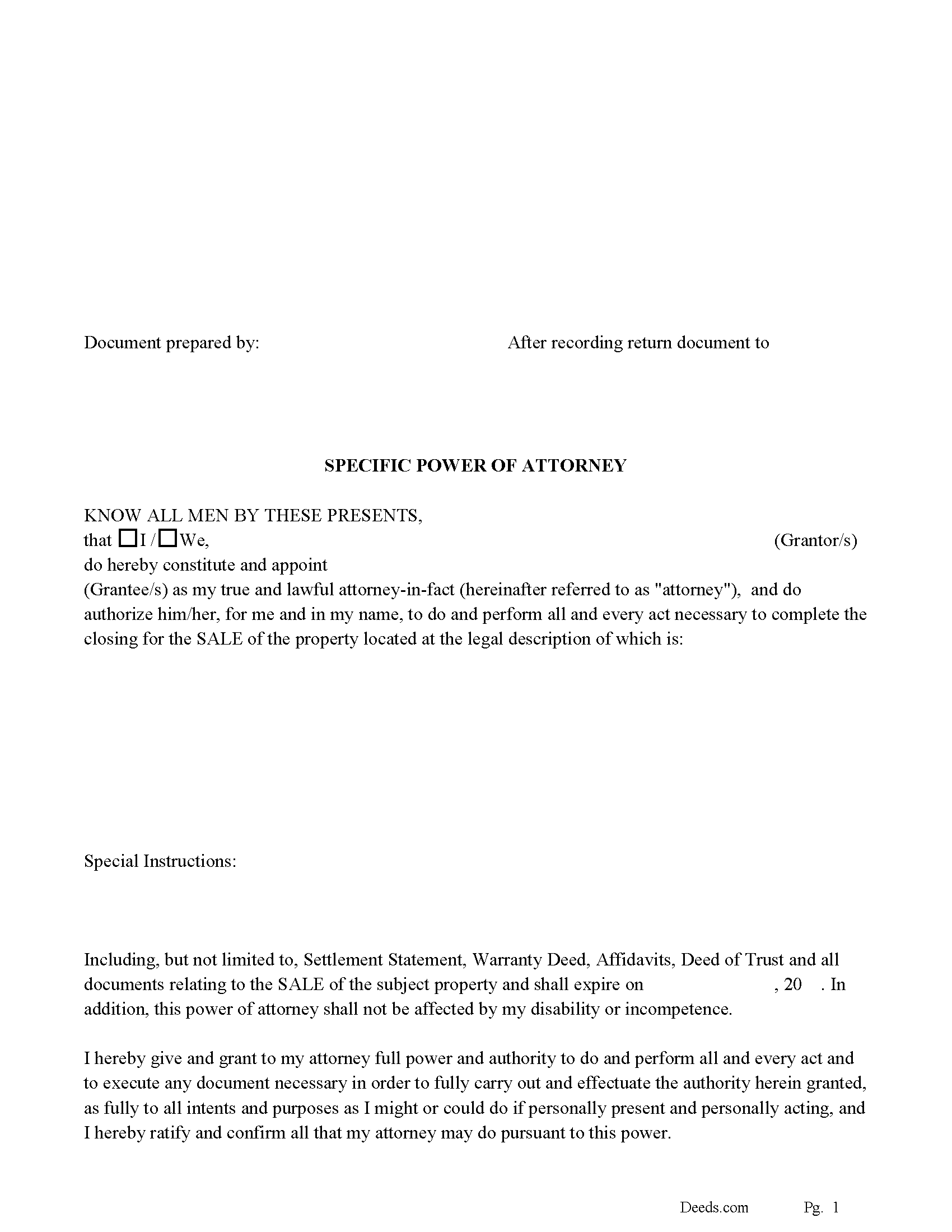
Use this form to authorize an attorney-in-fact to do and perform all and every act necessary to complete the closing for the SALE of a specific property. This form expires on a date of your choice and includes a "Special Instructions" section in which you can further limit or define the powers granted by you to your attorney-in-fact.
This POA is durable and shall not be affected by your disability or incompetence.
For use when the subject property is located in Missouri.
(Missouri SPOA-Sale Package includes form, guidelines, and completed example)
... More Information about the Missouri Specific Power of Attorney for the Sale of Property
Beneficiary Deed
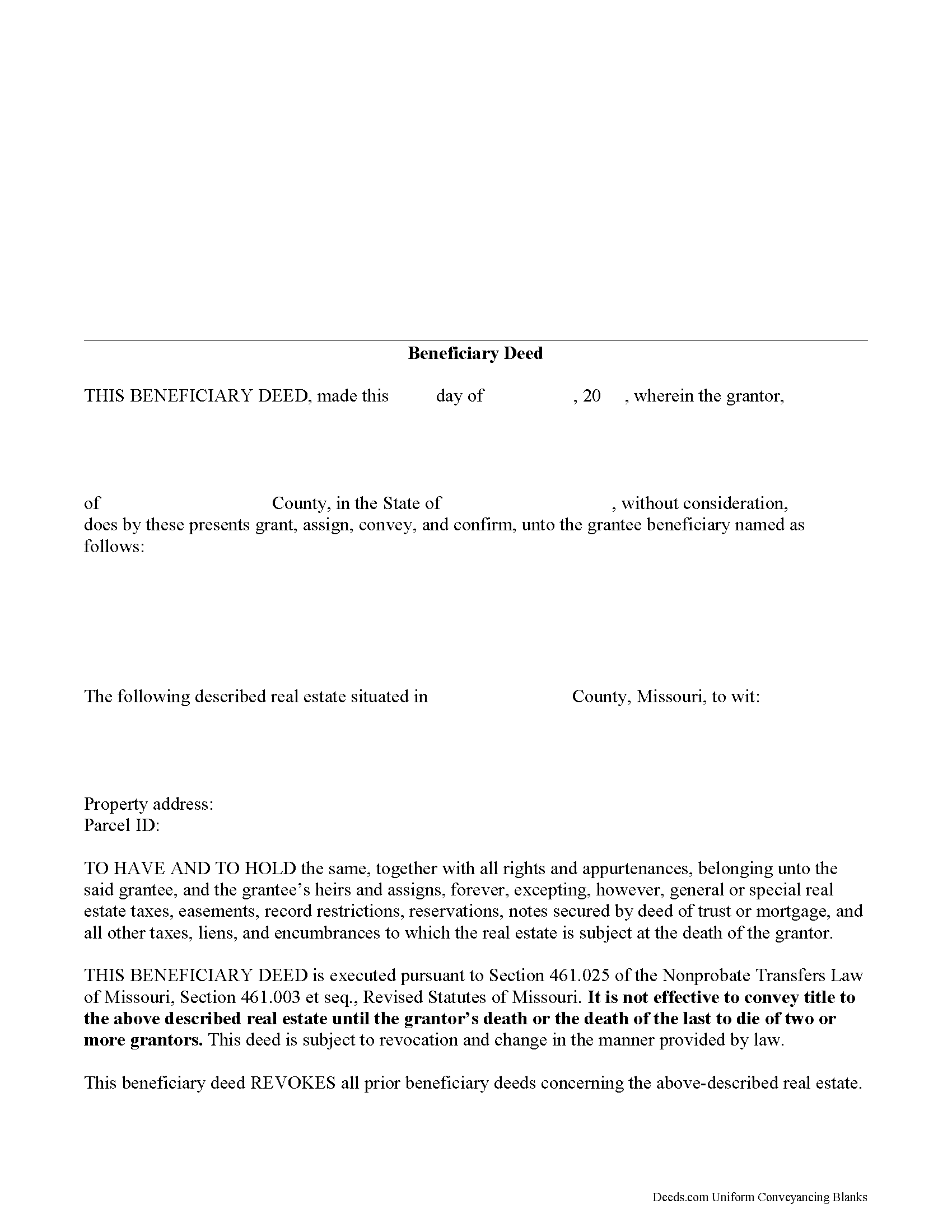
Enacted in 1989, the Missouri Nonprobate Transfers Law (Sections 461.003 et seq, Revised Statutes of Missouri (2012)) allows those who own real property in Missouri the option of conveying real property after death, but without the need for probate distribution.
One distinctive feature of this useful estate planning tool is its flexibility. The grantor retains absolute ownership of and control over the Missouri real estate, with the freedom to sell, rent, mortgage, or otherwise use the land at will with no penalty for waste or obligation to inform the named beneficiary. He or she may also change details about beneficiaries or even revoke the beneficiary deed outright by executing and recording a new document containing the updated information. For the beneficiary deed and any related changes or revocations to be valid, however, the deed must be recorded during the grantor's lifetime.
This flexibility is possible because the transfer of ownership is incomplete. There is no statutory obligation to notify grantees of their beneficiary status, so there is typically no consideration (something of value, usually money) paid for the potential future interest in the real estate. Th... More Information about the Missouri Beneficiary Deed
Revocation of Beneficiary Deed
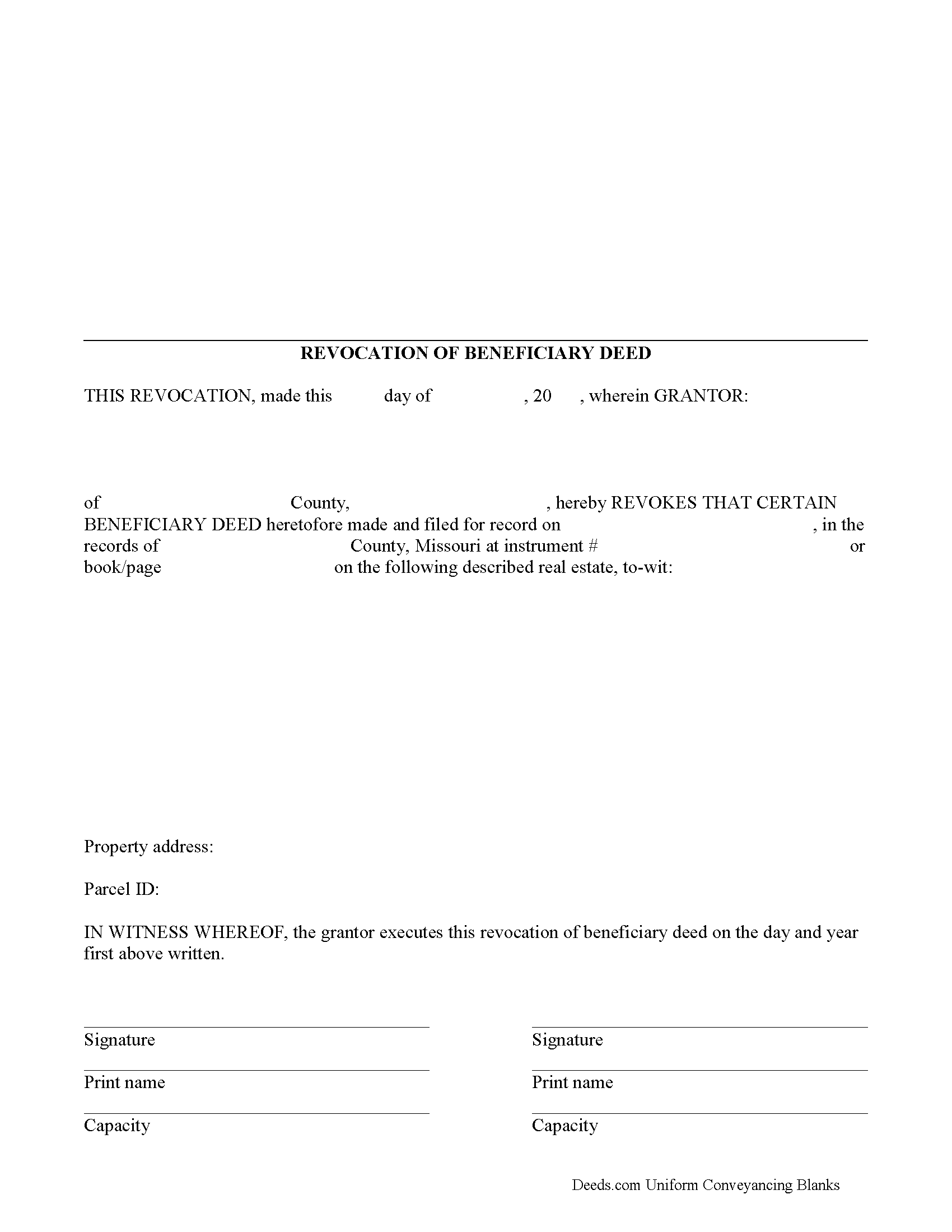
One of the many useful aspects of the Nonprobate Transfers Law of Missouri (RSMo Sections 461.003 to 461.081) is the option to revoke a previously recorded beneficiary deed. Revocation is specifically addressed in RSMo 431.033. The option to revoke is possible for several reasons: the grantor is not required to notify the beneficiary of the potential future interest; there is no consideration given in exchange for property rights; and the transfer of ownership is not completed until the grantor or grantors have all died. As a result, the named beneficiary has no actual interest in the real estate.
A grantor on a beneficiary deed may change or revoke beneficiary designations at will, and with no obligation to the individuals named as beneficiaries on the deed. To accomplish this, the original grantor (or grantors) may record a signed, notarized notice of revocation with the same office that accepted the original beneficiary deed. While effective, real estate that is not re-conveyed under a new beneficiary deed reverts back to the grantor's estate at his/her death, and is then distributed via the probate process. Alternately, the grantor may execute a new beneficiary deed, design... More Information about the Missouri Revocation of Beneficiary Deed
Affidavit as to Death of Grantor
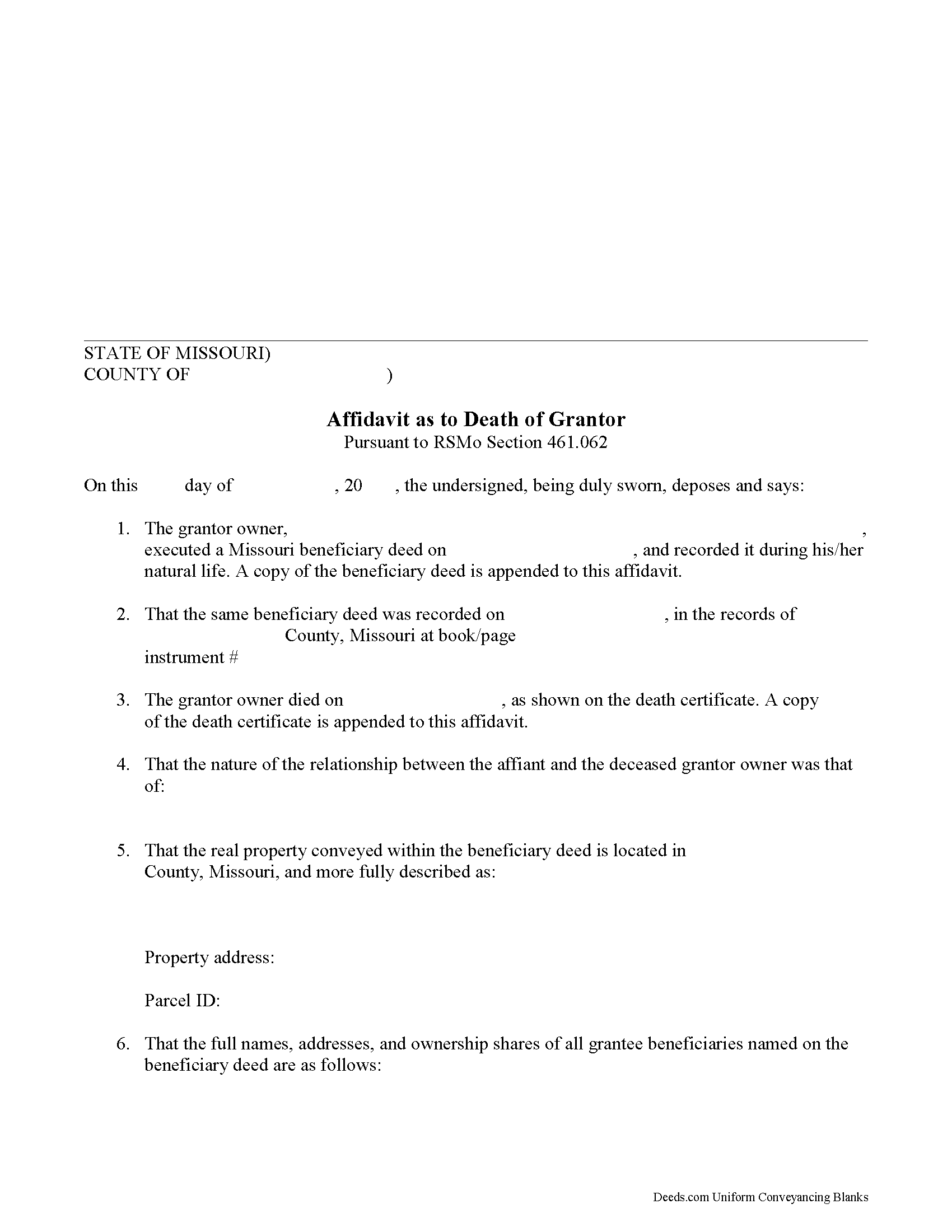
The Nonprobate Transfers Law of Missouri, Sections 461.003 to 461.081 RSMo (2012) has been in effect since 1989. While the law is specific on requirements for the beneficiary deed, it is less clear on the process for accepting the real property rights conveyed. Section 461.062, however, offers some guidance.
Under the Nonprobate Transfers Law of Missouri, <b>grantee beneficiaries</b> who survive the deceased <b>owner</b> by at least 120 hours gain ownership of property designated as "transfer on death" by function of law, upon the <b>death of the owner</b> (461.042). There are two primary reasons to formalize this transfer of ownership, even though it is supposed to happen automatically.
First, it is always a good idea to record changes to the named owner of real estate, providing notice to the public that the former beneficiary now holds title to the land and keeping the ownership history up to date. This ownership history is called the chain of title. A clear chain of title (with no gaps or interruptions) makes property easier to sell by reducing the chances of unexpected claims from others trying to assert their ownership rights.
Then, by recording an affidavit assertin... More Information about the Missouri Affidavit as to Death of Grantor
Affidavit of Deceased Joint Tenant
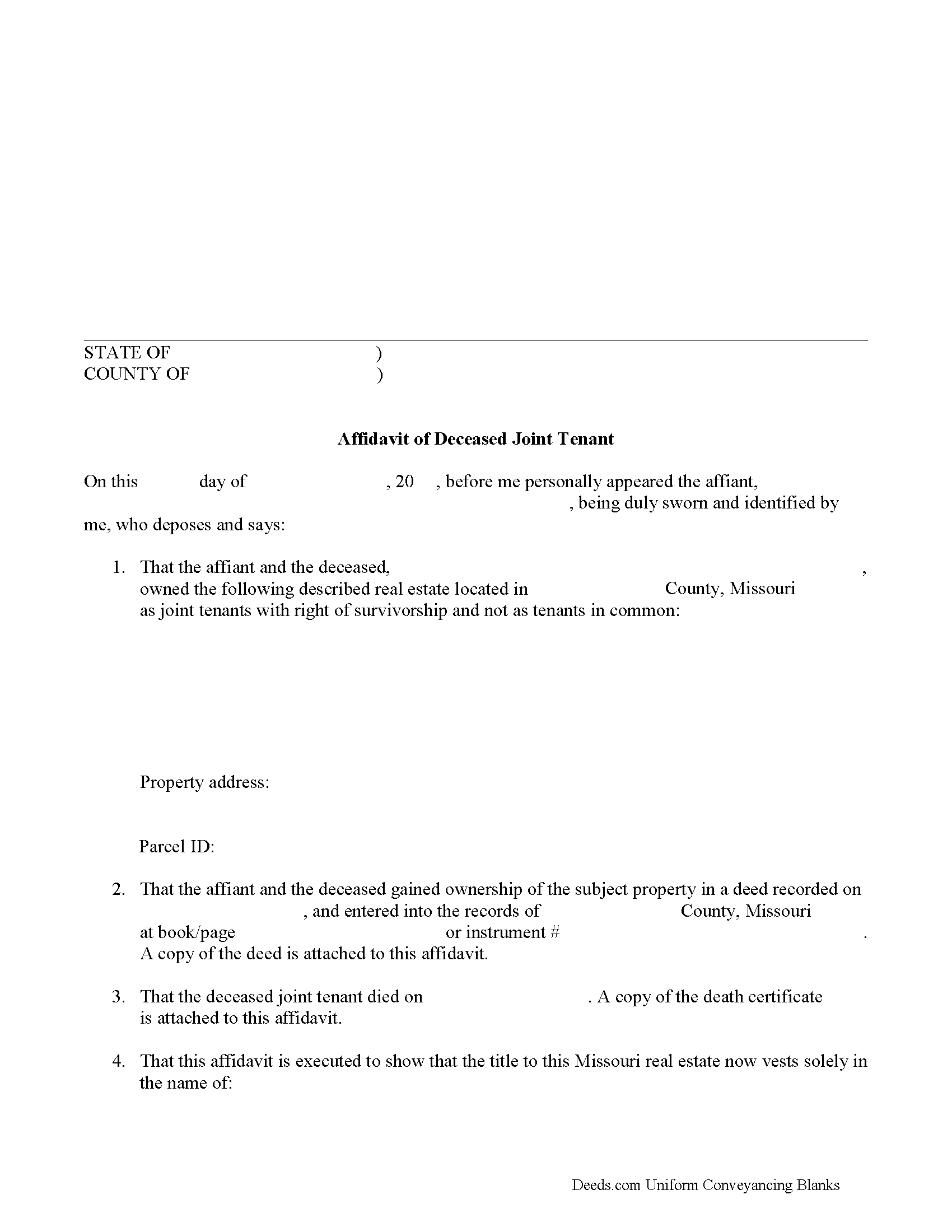
The process of removing a deceased joint tenant from a Missouri deed is fairly simple.
When two or more property owners hold title as joint tenants with right of survivorship, and one co-owner dies, the surviving owners share the decedent's interest in the land by function of law, and outside of the probate process.
Even though the transfer of ownership rights is, in theory, automatic, it makes sense to formalize the change in title. One way to accomplish this is by completing and recording an affidavit of deceased joint tenant document, accompanied by official copies of the recorded deed showing the joint tenancy and the deceased owner's death certificate. His/her name will still appear on the deed, but the records will show that the property rights were transferred to the surviving owner.
To remove the decedent's name altogether, execute a new deed showing both joint tenants as grantors and only the survivor as a grantee. For example: "John Doe (deceased) and Richard Roe, as joint tenants with right of survivorship, convey to Richard Roe as sole owner." Present the new deed along with the affidavit of surviving joint tenant or submit it for recording on its own at a l... More Information about the Missouri Affidavit of Deceased Joint Tenant
Trustee Deed
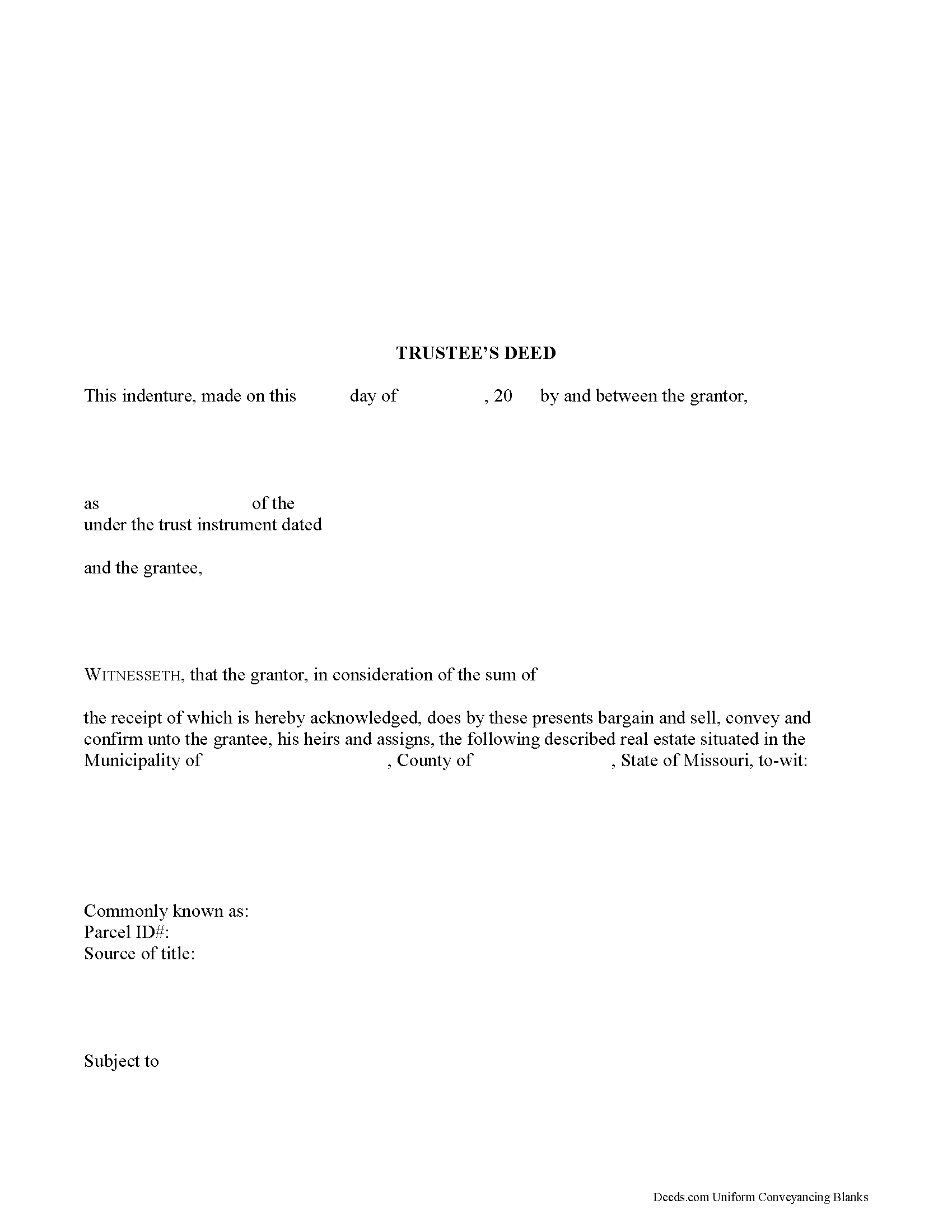
A trustee uses a trustee's deed to convey property held in a living trust in Missouri.
In a trust arrangement, the settlor conveys property to the trustee, who holds title to the property for the benefit of a third party, the trust's beneficiary.
The trustee is the administrator of the trust whose power to sell trust property, in this case, is conferred by the trust instrument, the document executed by the trust's settlor establishing the trust and containing the trust provisions. The Missouri Uniform Trust Code also confirms the trustee's power to "acquire or sell property in divided or undivided interests, for cash or on credit, at public or private sale" ( 456.8-816, RSMo).
The granting language of "bargain and sell, convey and confirm" is the common language used in Missouri to transfer property to a grantee with special warranty. A special warranty contains limited covenants of clear title (subject to noted encumbrances), and protection against claims arising by or through the grantor only.
In addition to meeting the requirements for content and format required by standard deeds, such as quitclaim or warranty deeds, trustee's deeds must also reference the trust inst... More Information about the Missouri Trustee Deed
Trustee Deed Under Sale (Foreclosure)
.png)
A trustee's deed under sale, also known as a trustee's deed and bill of sale under foreclosure, is a document used to convey real property to the highest bidder at a trustee's sale. A trustee's sale is part of the non-judicial foreclosure process, initiated when a borrower defaults on the terms of the security instrument (deed of trust), and the lender instructs the trustee to commence with foreclosing.
Under a deed of trust, a grantor (borrower) conveys title to a trustee as security for the repayment of a loan to the beneficiary (lender). The trustee is generally an agent of the lender. The power of sale clause contained within the deed of trust allows the trustee may sell property by public or private sale upon the default on conditions set forth by the security instrument.
The process for the non-judicial foreclosure under a deed of trust is codified at Chapter 443 of the Missouri Revised Statutes. The trustee is required to fulfill certain obligations prior to the trustee's sale, including the publication and mailing of a notice of sale, and any requirements at the municipal level.
Typically, the trustee's deed is executed by a successor trustee, and not the original... More Information about the Missouri Trustee Deed Under Sale (Foreclosure)
Personal Representative Deed
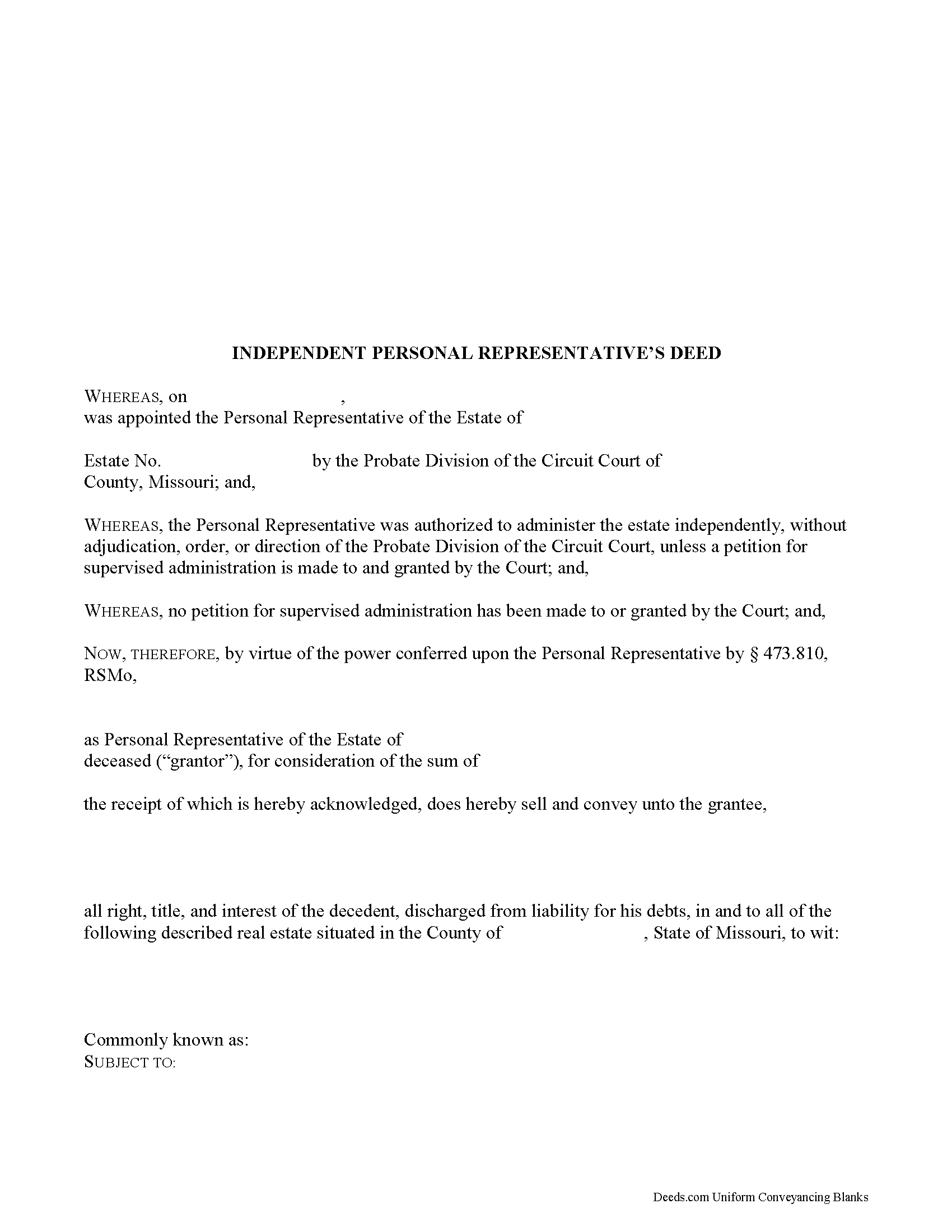
Missouri Personal Representative's Deed for an Independent Personal Representative
The laws governing Missouri probate proceedings are codified at Chapters 472-475 of the Missouri Revised Statutes.
An independent personal representative's deed is a fiduciary instrument used to transfer a decedent's interest in real property to a purchaser. A personal representative (PR), who may alternately be referred to as either an executor or an administrator, is the person appointed by the Probate Division of the Circuit Court to manage the decedent's estate.
Use the personal representative's deed in independent administration when the PR is authorized to sell real estate under a power conferred by the decedent's will ( 473.457, RSMo). The PR's deed must meet all state and local standards for content and format. It also makes reference to the deceased owner and the probate case, and might require supporting documents such as an official copy of the death certificate.
Consult an attorney licensed in the State of Missouri with questions about personal representative's deeds or any other issues related to probate.
(Missouri PRD Package includes form, guidelines, and completed examp... More Information about the Missouri Personal Representative Deed
Personal Representative Deed of Sale
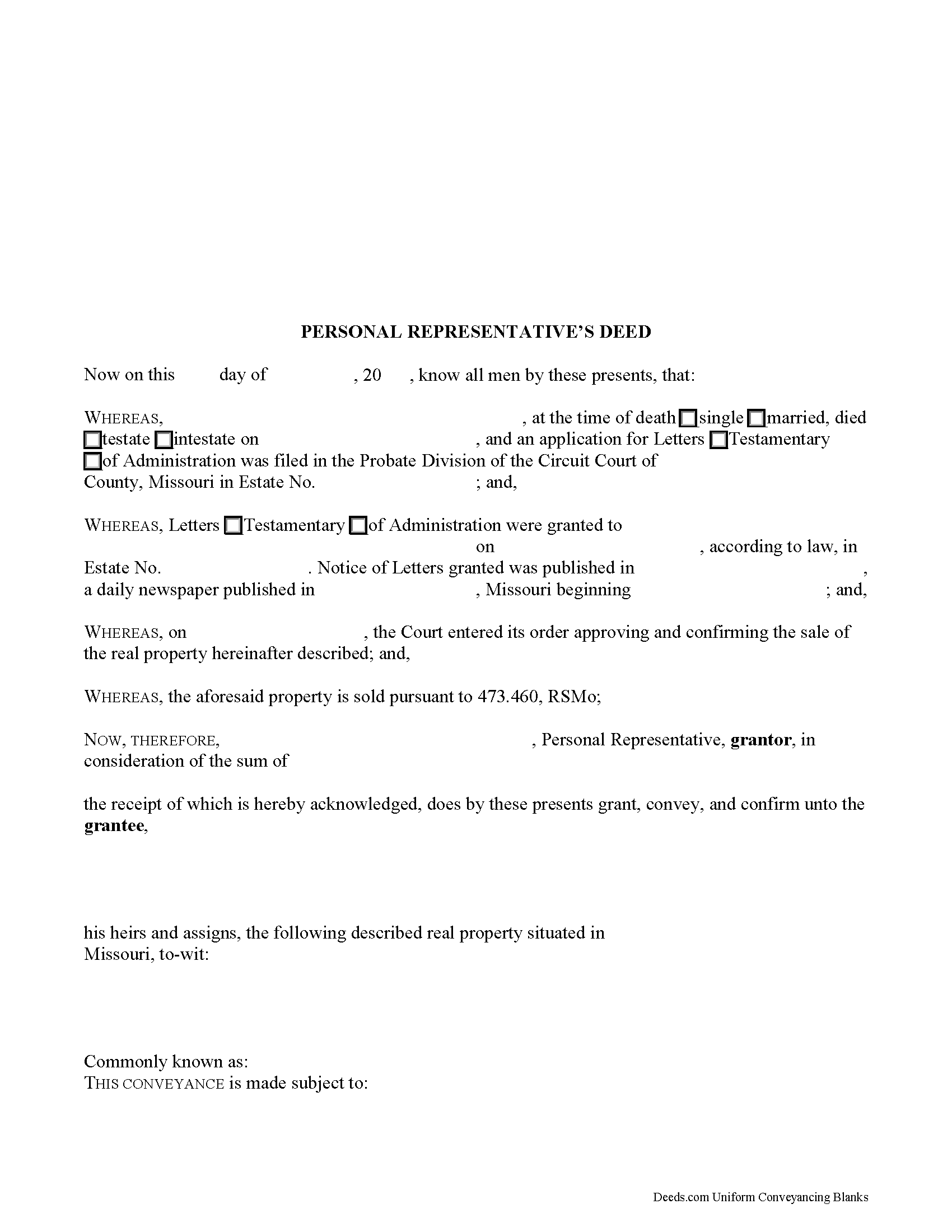
Missouri Personal Representative's Deed with Order for Sale ( 473.460, RSMO)
The laws governing Missouri probate proceedings are codified at Chapters 472-475 of the Missouri Revised Statutes.
A personal representative's deed pursuant to an order for sale under 473.460, RSMo is a fiduciary instrument used to transfer a decedent's interest in real property to a purchaser. A personal representative, who may alternately be referred to as either an executor or an administrator, is the person appointed by the Probate Division of the Circuit Court to manage the decedent's estate.
473.460, RSMo, outlines the purposes for which a personal representative may sell real property from the estate with the Court's authorization, including to pay claims against the estate; pay allowance to a surviving spouse and minor children of the decedent; pay a legacy given by the decedent's will; pay administrative expenses and taxes due on the estate or taxes assessed on transfers from the estate; and for any other purpose deemed in the best interest of the estate. Real property may also be sold to enable distribution of the estate.
Consult an attorney licensed in the State of Missouri with q... More Information about the Missouri Personal Representative Deed of Sale
Personal Representative Deed of Distribution
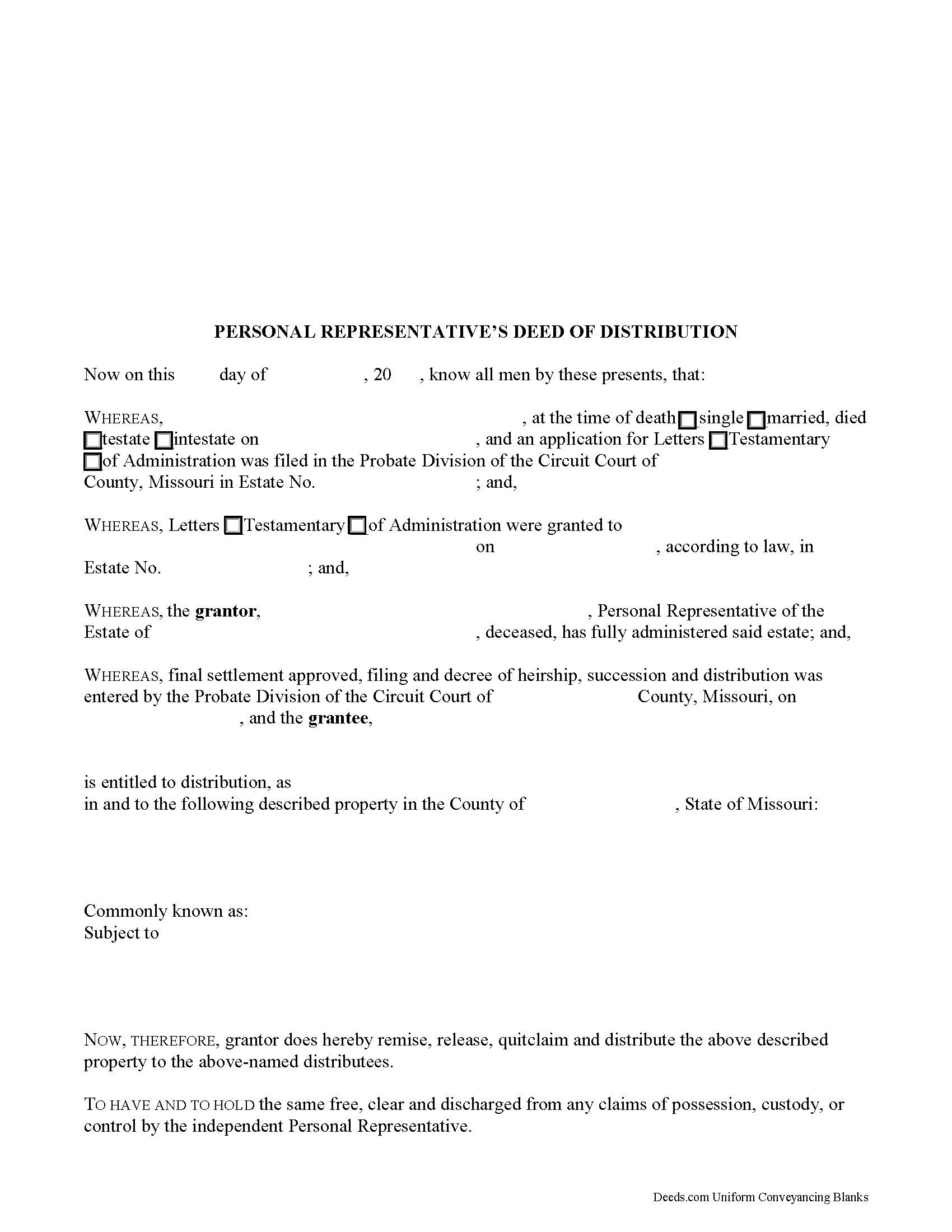
The laws governing Missouri probate proceedings are codified at Chapters 472-475 of the Missouri Revised Statutes.
The personal representative's deed of distribution is a fiduciary instrument recorded as evidence that a distributee has succeeded to the decedent's interest in real property. A personal representative, who may alternately be referred to as either an executor or an administrator, is the person appointed by the Probate Division of the Circuit Court to manage the decedent's estate.
Use a deed of distribution to quitclaim the decedent's interest in real estate. By operation of law, the decedent's heirs automatically succeed to the decedent's interest, but a deed of distribution is recorded alongside the decedent's will, if applicable, to maintain an accurate chain of title. The PR's deed must meet all state and local standards for content and format. It also makes reference to the deceased owner and the probate case, and might require supporting documents such as an official copy of the death certificate.
Consult an attorney licensed in the State of Missouri with questions about personal representative's deeds or any other issue related to probate.
(Missouri P... More Information about the Missouri Personal Representative Deed of Distribution
Contractor Change Order
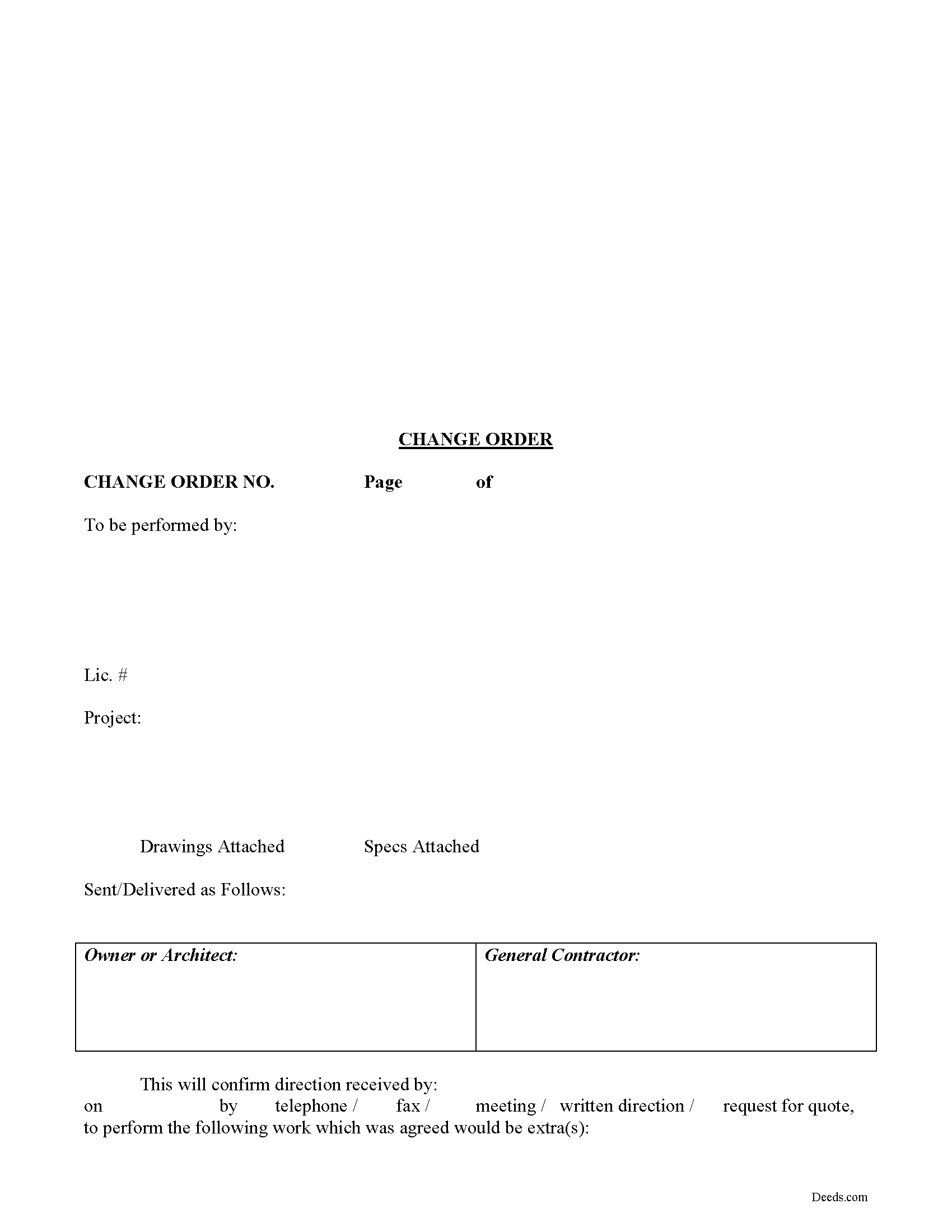
Using Change Orders in Missouri
Plans and circumstances change. This causes frustration for those in the construction industry, where even small variations can result in substantial differences in the cost of a job.
Because of this, contractors should confirm changes in the construction contract via a Change Order. Change orders are used to modify the preexisting agreement of the parties (such as the contractor's promise to perform certain work and the customer's promise to pay for such work). Usually, changes lead to increased costs, additional time to complete the job, and possibly a change of the underlying contractual terms.
These documents identify the parties, the location, the nature of the change, and relevant dates and fees. The completed change order should be kept on file to resolve any potential disputes in regard to extra work performed and additional costs.
This article is provided for informational purposes only and should not be considered legal advice or relied upon as a substitute for speaking with a legal professional. If you have any questions about using a change order, or any other issues related to liens in Missouri, please speak with a qualified... More Information about the Missouri Contractor Change Order
Consent of Owner
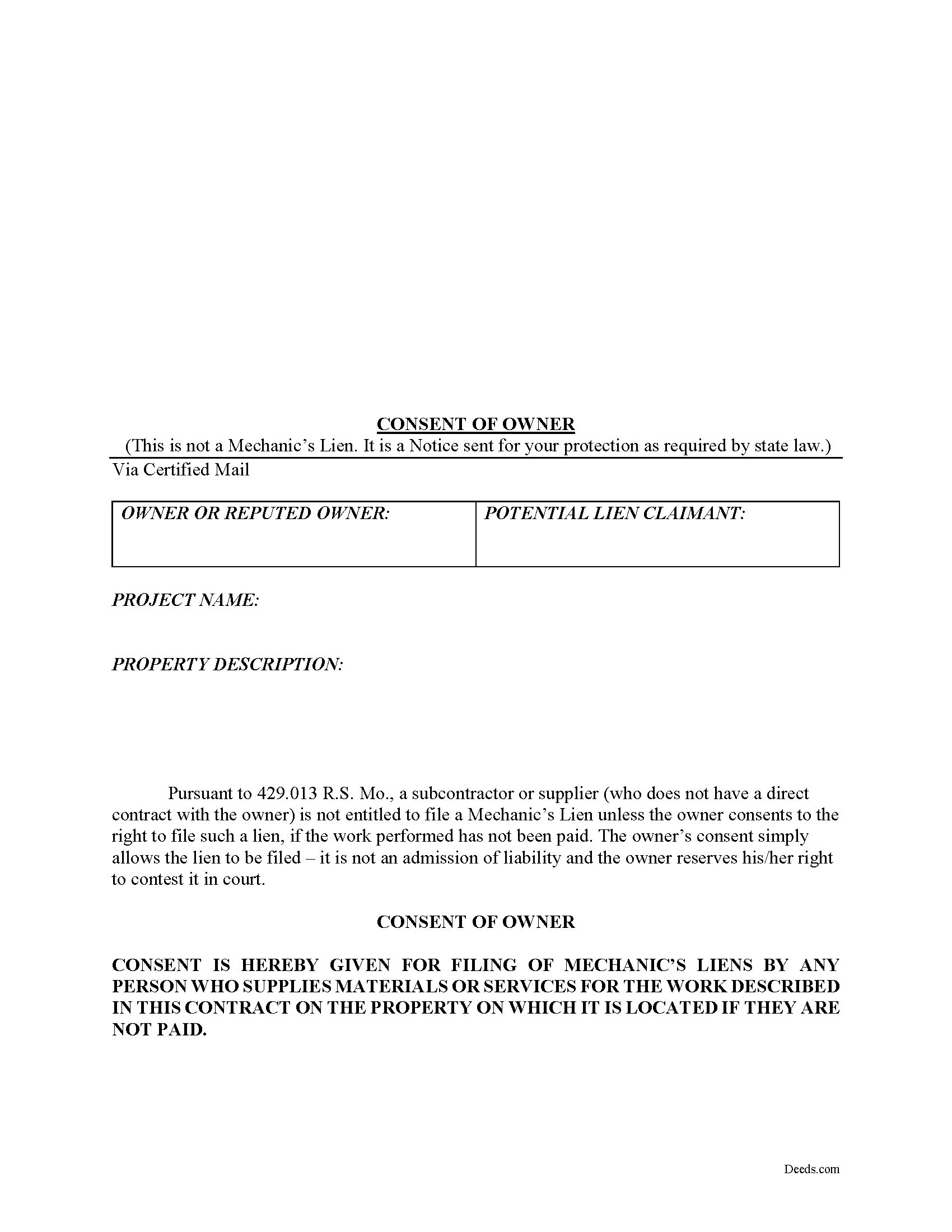
Owner's Consent to Mechanic's Lien Filing
When working on owner-occupied residential projects, contractors other than the main contractor need to ensure that the owner has provided consent for a lien filing if the bill goes unpaid. In Missouri, these individuals can use a Consent by Owner form to fulfill this requirement.
Request that the owner completes the consent form when working on the repair or remodeling of or an addition to an owner-occupied residential property of four units or less. R.S.M.O 429.013. This document identifies the parties, the project, and the property, and must be signed in the presence of a notary.
Record the completed consent form, because otherwise, no person other than the original contractor, who performed any work or labor or furnished any materials is eligible to claim a lien on the same job unless an owner of the building or structure, pursuant to a written contract, has agreed to be liable for such costs in the event that the costs are not paid. R.S.M.O 429.013(2). The consent form takes care of that issue.
In addition, every original contractor must retain a copy of the notice and any consent signed by an owner, and shall furnish a co... More Information about the Missouri Consent of Owner
Notice of Intent
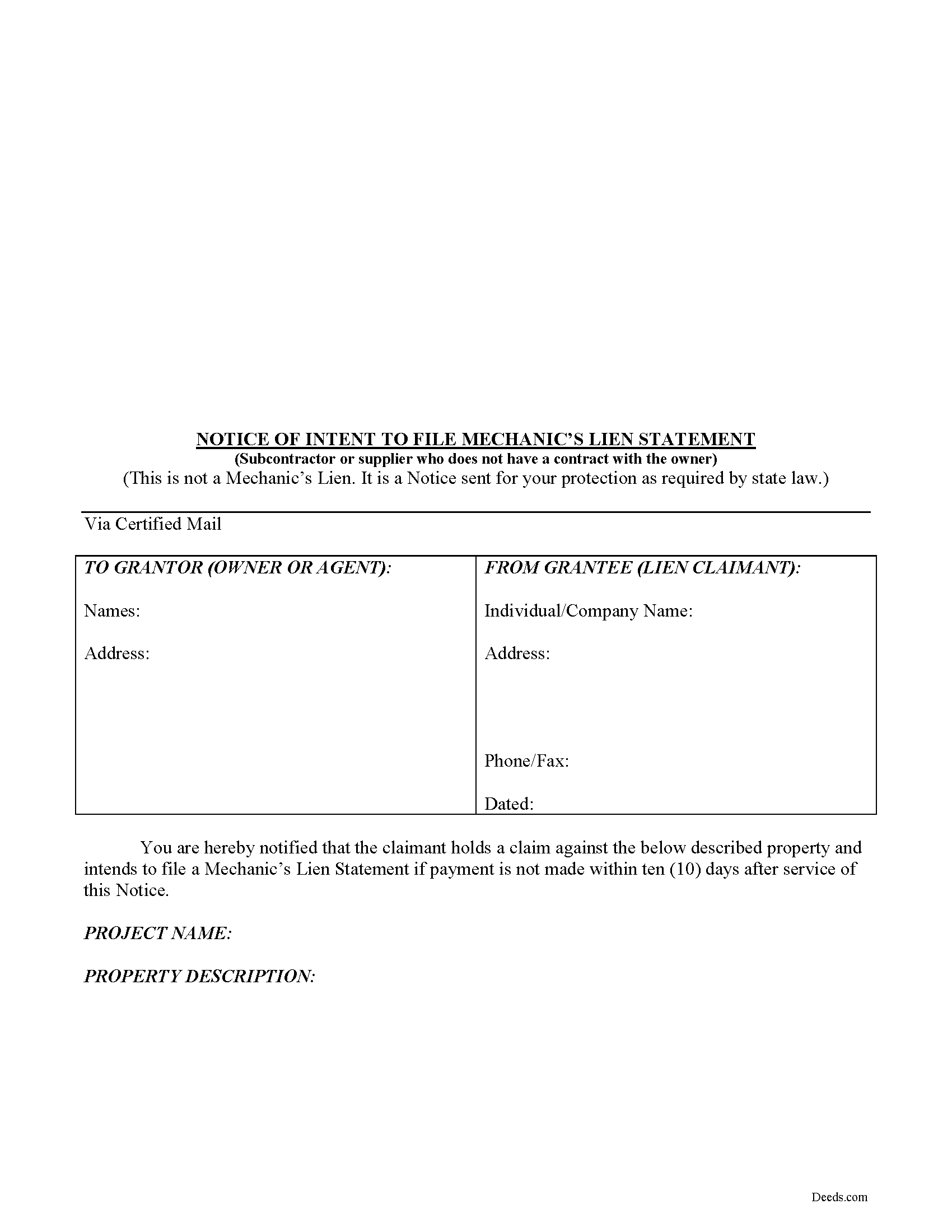
Missouri Notice of Intent to File a Mechanic's Lien
Mechanic's lien claimants who have not contracted directly with the owner (or the owner's agent) of the subject property must ensure proper notice is delivered to these parties before claiming a lien. In Missouri, the proper form of notice is a document called a Notice of Intent to File a Mechanic's Lien.
Every person except the original contractor shall give ten (10) days' notice before filing the lien, to the owner, owners or agent, or either of them, that he holds a claim against such building or improvement. R.S.M.O. 429.100.
The notice must set forth the party responsible for paying, identify the owner and lien claimant, the common name and address, and legal description of the subject property, a description of work or services provided including dates, the general contractor's name and address, and the amounts due along with any extras or past payment deductions noted. Id.
Any officer authorized by law to serve process in civil actions, or by any person who would be a competent witness may serve the notice. Id. When the Notice is served by an officer, his official endorsed return counts as proof of service. I... More Information about the Missouri Notice of Intent
Notice of Rights
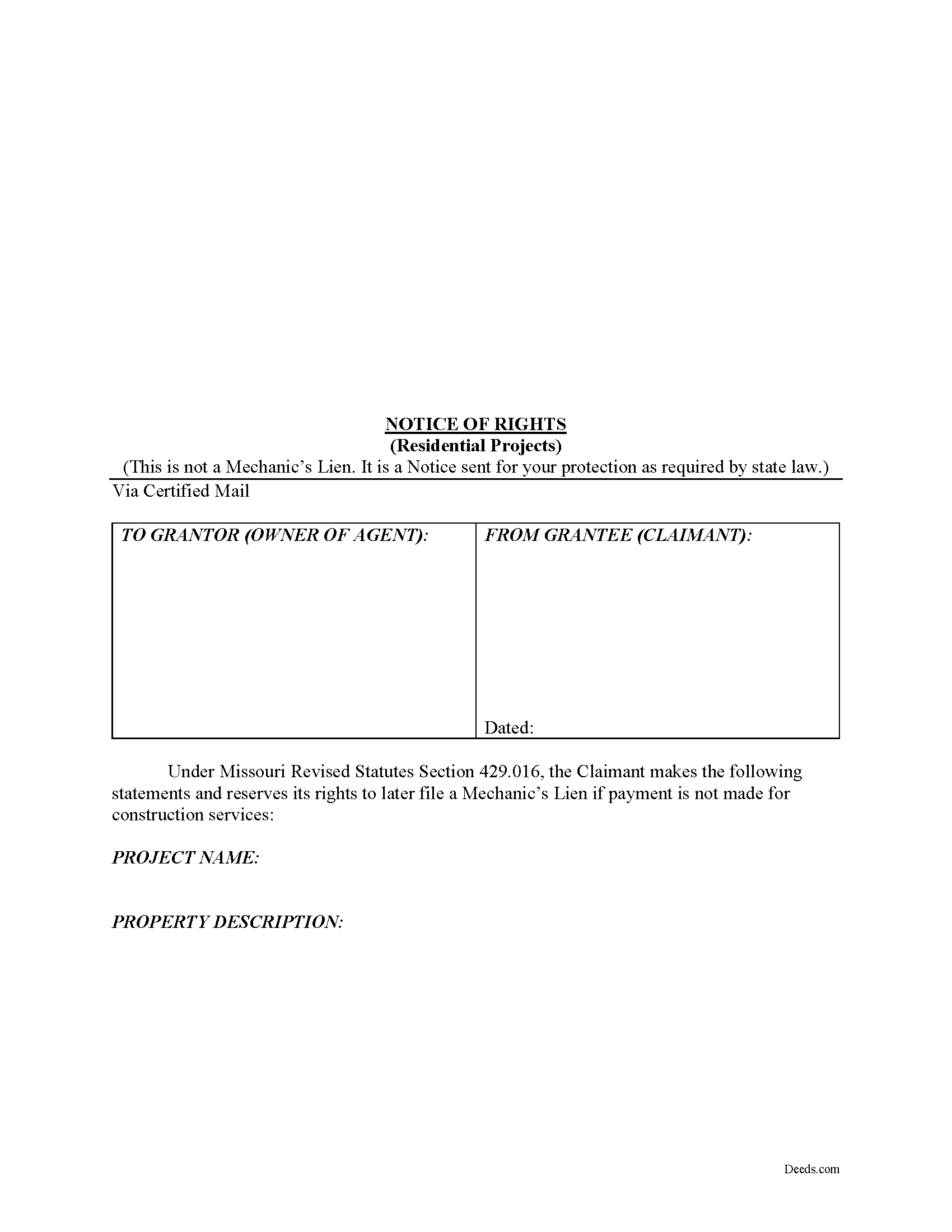
Preserving Lien Rights After Sale of Residential Property
When residential property is involved, lien claimants in Missouri must take precautions to ensure that their lien rights survive, even if the owner transfers the property by sale. Filing and serving a document called a "Notice of Lien Rights" will protect those rights.
Under R.S.M.O. 429.016(1), any person or entity who seeks to retain the right to assert a mechanic's lien against residential real property must record a notice of rights in the office of the recorder of deeds for the county in which the property is located, not less than five (5) calendar days prior to the intended date of closing stated in a notice of intended sale.
Failure to record the notice effectively waives and forfeits any right to assert a mechanic's lien against the property. R.S.M.O. 429.016(2). The claimant retains all other rights and remedies allowed by law to collect payment for work, labor, and materials. Id. So, all hope is not lost for those who miss the deadline, but they have limited their available options.
If a notice of rights is recorded after the owner's conveyance (sale) of the property to a bona fide purchaser for value ... More Information about the Missouri Notice of Rights
Claim of Mechanic's Lien
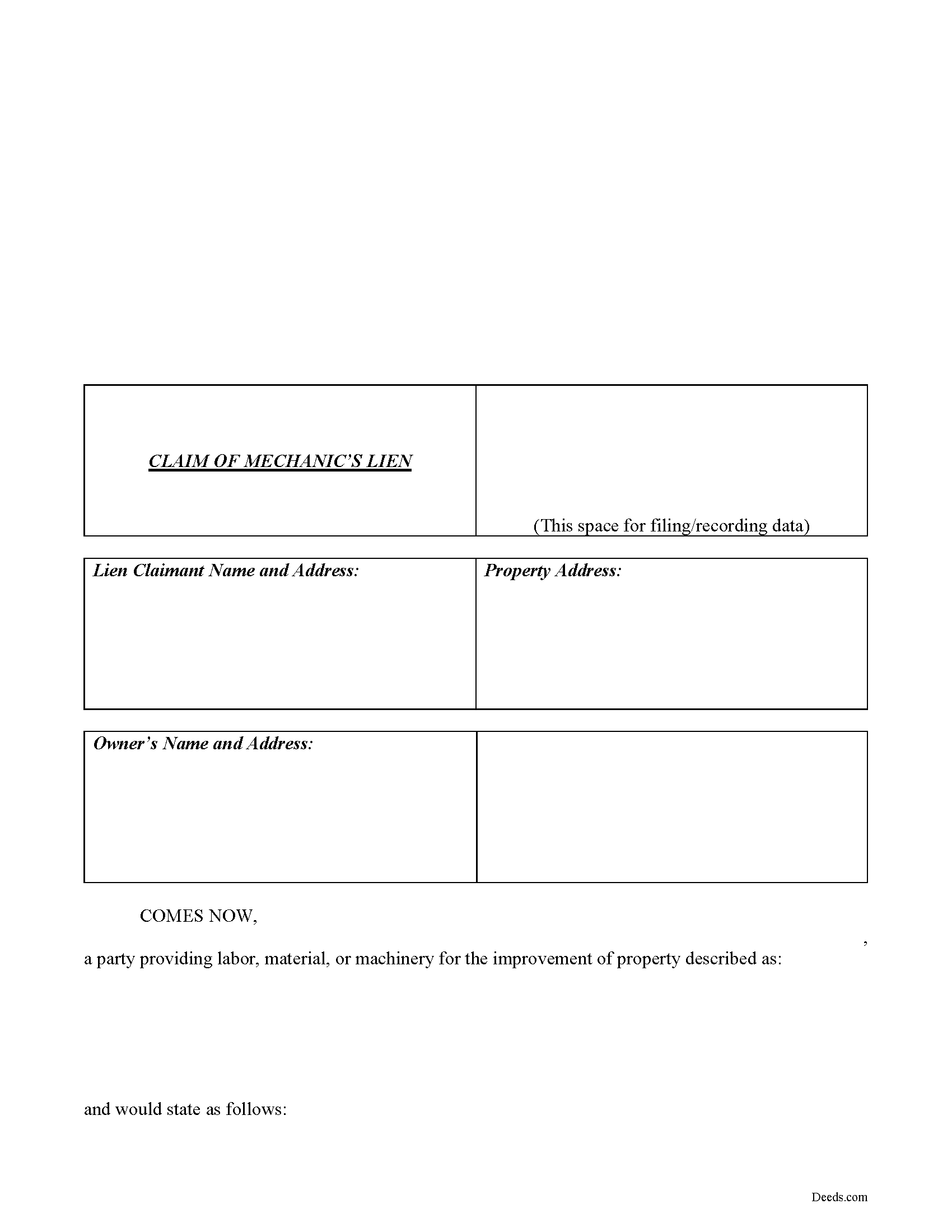
Claiming a Missouri Mechanic's Lien
In Missouri, Mechanic's Liens are used to place a block on a property owner's title when a contractor, materials supplier, or other laborer such as a subcontractor has not been paid for labor, materials, or equipment provided.
Under R.S.M.O. 429.080, all eligible individuals seeking to obtain the benefit of a mechanic lien must file a claim of lien within six (6) months after the indebtedness accrues, or, with respect to rental equipment or machinery rented to others, within sixty (60) days after the date the last of the rental equipment or machinery was last removed from the property.
The claim must state a just and true account of the demand due after all just credits have been given, and that amount becomes a lien upon such building or other improvements. It also includes the names and addresses of the lien claimant and property owners; a true description of the property; a description of the labor, materials, or equipment provided; and the amount the lien is claimed for. Id. The claim must also be verified by the oath of the claimant or some credible person for him before a notary. Id. Record the completed claim of lien with the cle... More Information about the Missouri Claim of Mechanic's Lien
Partial Mechanic's Lien Waiver on Progress Payment
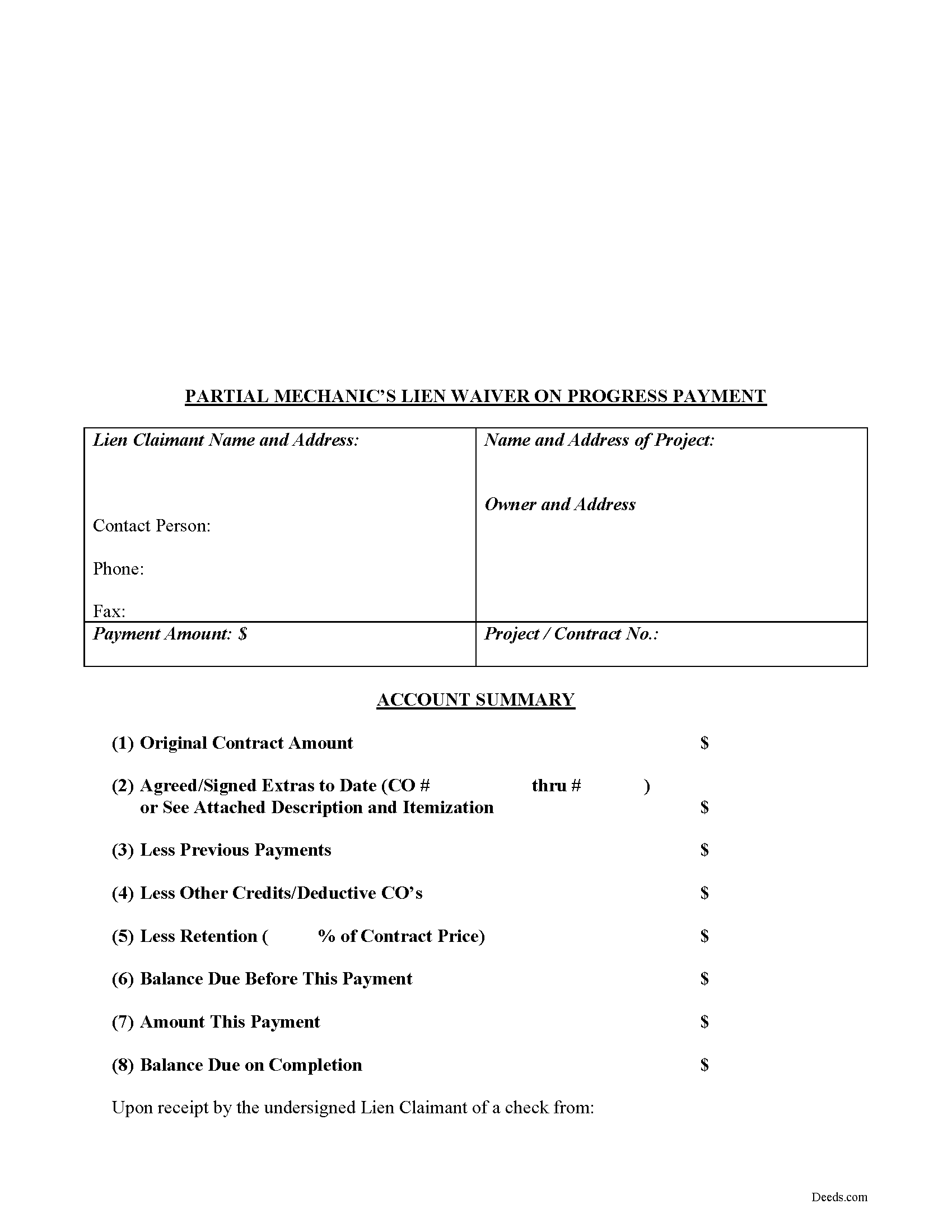
Lien waivers are used to facilitate payment between contractors, subcontractors, customers, and property owners. A waiver is a known relinquishment of a right. In this case, the person granting the waiver is relinquishing the right to seek a mechanic's lien for all or part of the amount due.
In general, there are two types of waivers: partial and final. A partial waiver is used when a progress or partial payment is made and money is still due and owing. The waiver applies only to the partial payment amount and is conditioned upon the actual receipt of that money (the check clears the bank). A final waiver releases all rights immediately. Be cautious about using the correct form of waiver, as partial waivers provide more protection to the lien claimant, while final waivers offer more protection for the customer or property owner.
The waiver must include details identifying the parties, the location of the project, relevant details from the original agreement such as work requested, costs and changes, important dates, payments, and any exclusions, conditions, or agreements. It also lists the dates covered by the partial waiver. The person waiving the lien gives a sworn statemen... More Information about the Missouri Partial Mechanic's Lien Waiver on Progress Payment
Mechanic's Lien Waiver on Final Payment
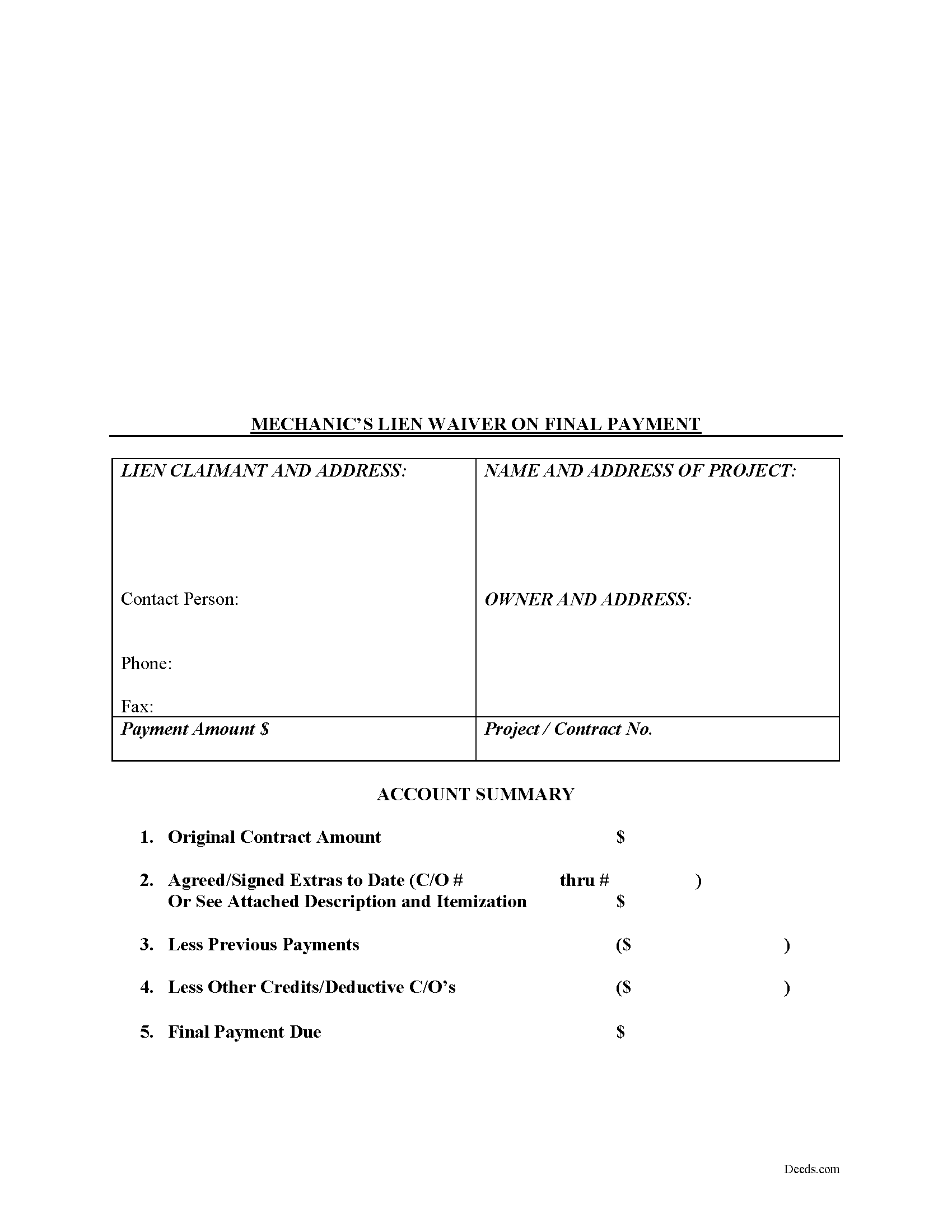
Lien waivers are used to facilitate payment between contractors, subcontractors, customers, and property owners. A waiver is a known relinquishment of a right. In this case, the person granting the waiver is relinquishing the right to seek a mechanic's lien for all or part of the amount due.
In general, there are two types of waivers: partial and final. A partial waiver is used when a progress or partial payment is made and money is still due and owing. The waiver applies only to the partial payment amount and is conditioned upon the actual receipt of that money. A final waiver releases all rights immediately. Be cautious about using the correct form of waiver, as partial waivers provide more protection to the lien claimant, while final waivers offer more protection for the customer or property owner.
The waiver must include details identifying the parties, the location of the project, relevant details from the original agreement such as work requested, costs and changes, important dates, payments, and any exclusions or agreements. The person waiving the lien gives a sworn statement in front of a notary, signs the form, and then records it in the property records for the coun... More Information about the Missouri Mechanic's Lien Waiver on Final Payment
Release of Mechanic's Lien
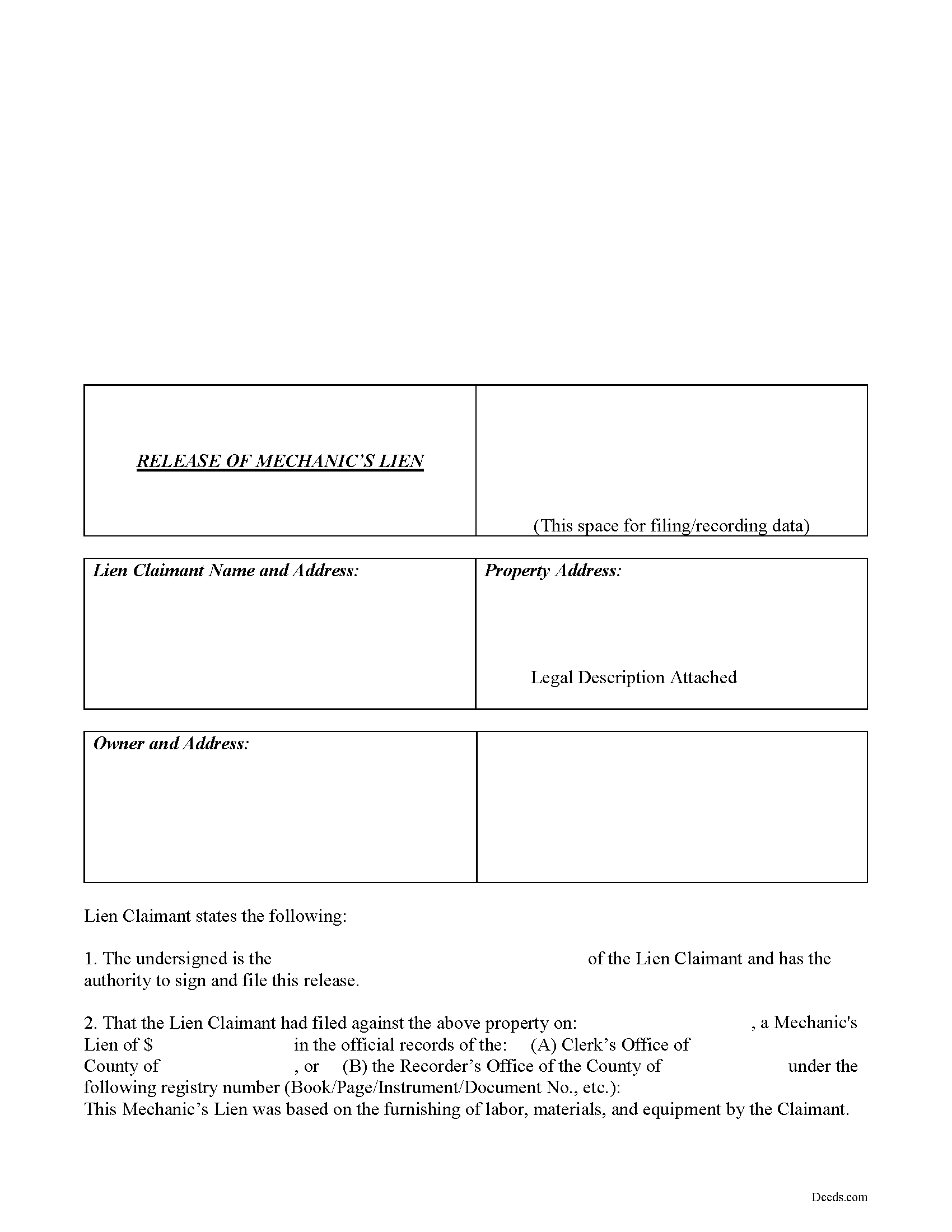
Releasing a Mechanic's Lien in Missouri
When a mechanic's lien debt has been paid off in full and there is no valid reason to continue encumbering the property, the claimant files a release to free the owner's land from the lien.
Under R.S.M.O. 429.120, whenever any debt, which is a lien upon any building or other improvement, shall be paid or satisfied, the creditor, if required, shall file an acknowledgment of such satisfaction with the clerk of the circuit court.
Failure to properly discharge a lien can lead to civil liability. If any creditor refuses to enter a satisfaction within ten (10) days after payment and request, he shall be liable to any person injured, to the amount of such injury and cost of suit. R.S.M.O. 429.130.
The lien release form contains the following information: 1) lien claimant's name and address; 2) owner's name and address; 3) address of the property subject to the lien; and 4) information about the filed lien such as date of filing, location filed (whether with the clerk of court or county recorder's office), and amount of the lien. The release should be filed with the same office where the original lien was filed or recorded.
This art... More Information about the Missouri Release of Mechanic's Lien
Lis Pendens Notice
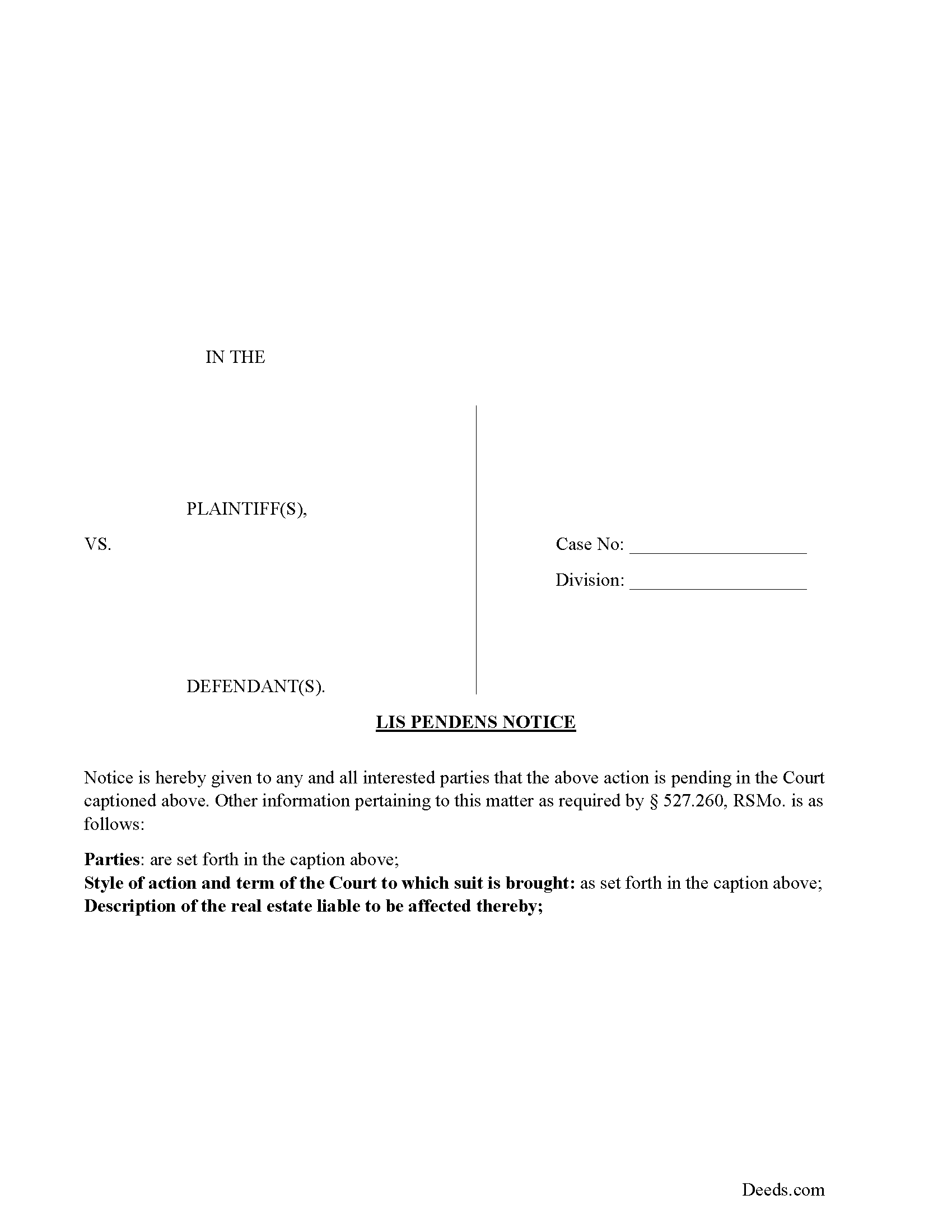
(In any Civil action) when claim/suit affects title to real property, (the plaintiff shall file for record, with the recorder of deeds of the county in which any such real estate is situated.)
Such notice will contain:
1. (Names of the parties)
2. (The style of the action and the term of the court to which such suit is brought)
3. (A description of the real estate liable to be affected thereby)
Once filed with the Recorder of Deeds the Lis Pendens becomes constructive notice to would be (purchasers and encumbrancers) MO Rev Stat 527.260.
(Missouri LP Notice Package includes form, guidelines, and completed example)
... More Information about the Missouri Lis Pendens Notice
Release of Lis Pendens Notice
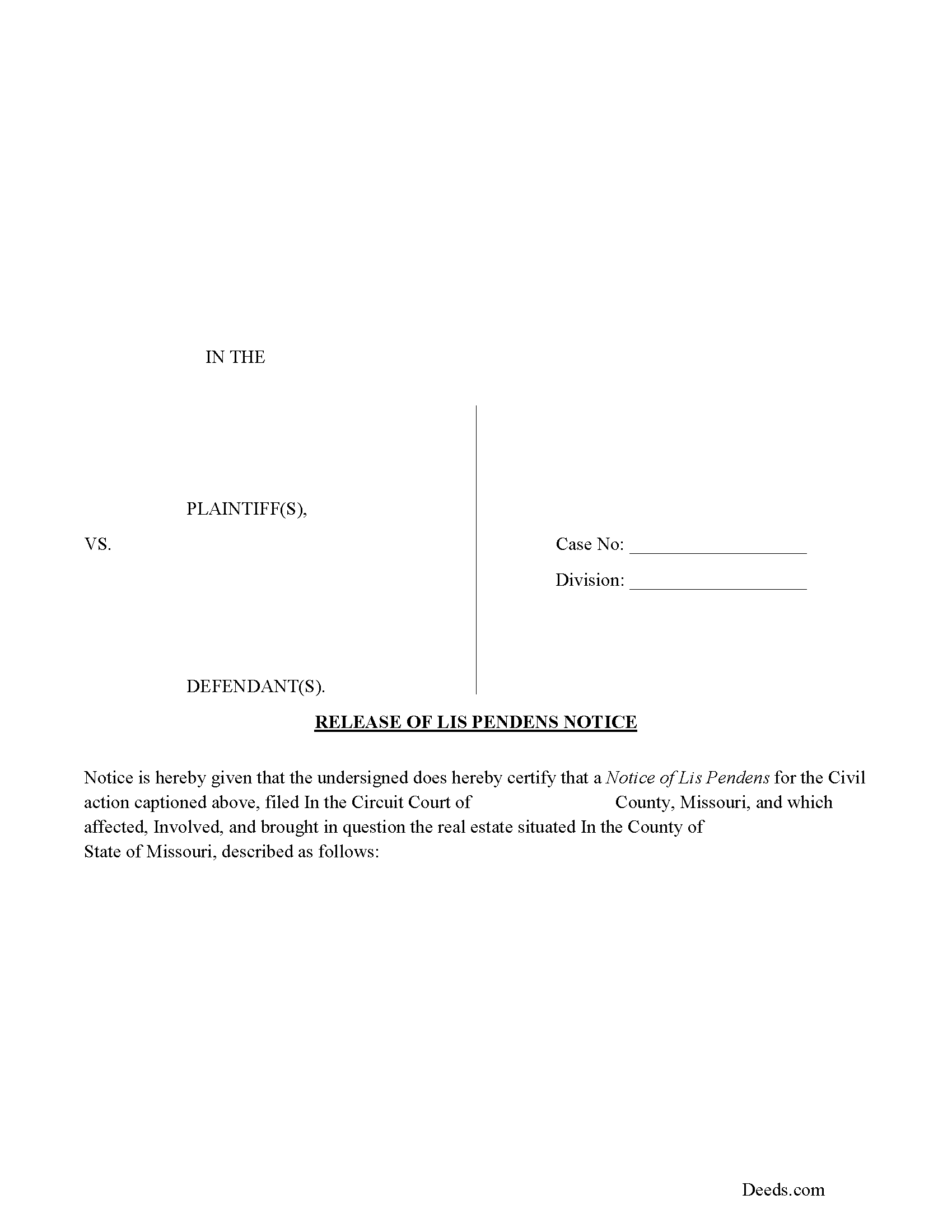
Use this form to Release a Notice of Lis Pendens that was previously recorded by the plaintiff. Missouri specific.
(Missouri Release of LP Package includes form, guidelines, and completed example)... More Information about the Missouri Release of Lis Pendens Notice
Deed of Trust and Promissory Note
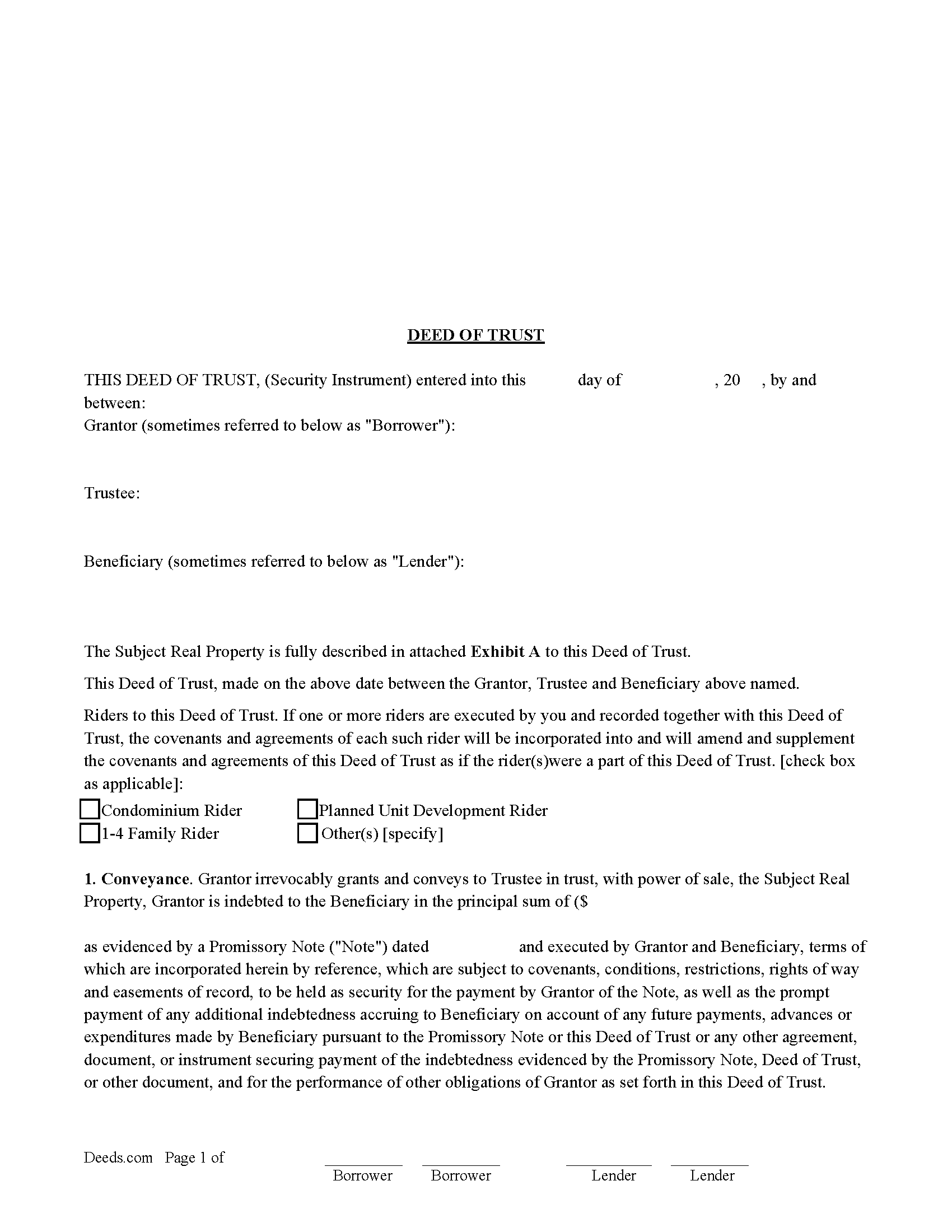
A Deed of Trust is a (security instrument securing the payment or satisfaction of any debt or other obligation.) (MRS 443.005) This is often considered a preferred method of financing real property because foreclosures are done non-judicially with no right of redemption, through a trustee sale, saving time (typically 60-90 days if uncontested) and expense. This Deed of Trust contains a "Power of Sale" clause, in the case of default the borrower(s) have pre-authorized the sale of the property. Without a "Power of Sale" a judicial foreclosure will likely have to be performed. (See 443.290 Mortgages and security agreements with power of sale)
The "Promissory Note" defines the terms of the loan, Principle owed, interest rate charged, default rate (interest charged if Note is in Default), late payment fees, etc.
These forms are flexible, use for residential, rental units, vacant land, small office and commercial. A "Special Provisions" section allows the lender to further customize the package to his/her needs. Can be used when existing liens are in place.
Fully formatted for recording. (See MRS 443.035. Recording of instrument required)
A Deed of Trust and Promissory Note th... More Information about the Missouri Deed of Trust and Promissory Note
Assignment of Deed of Trust
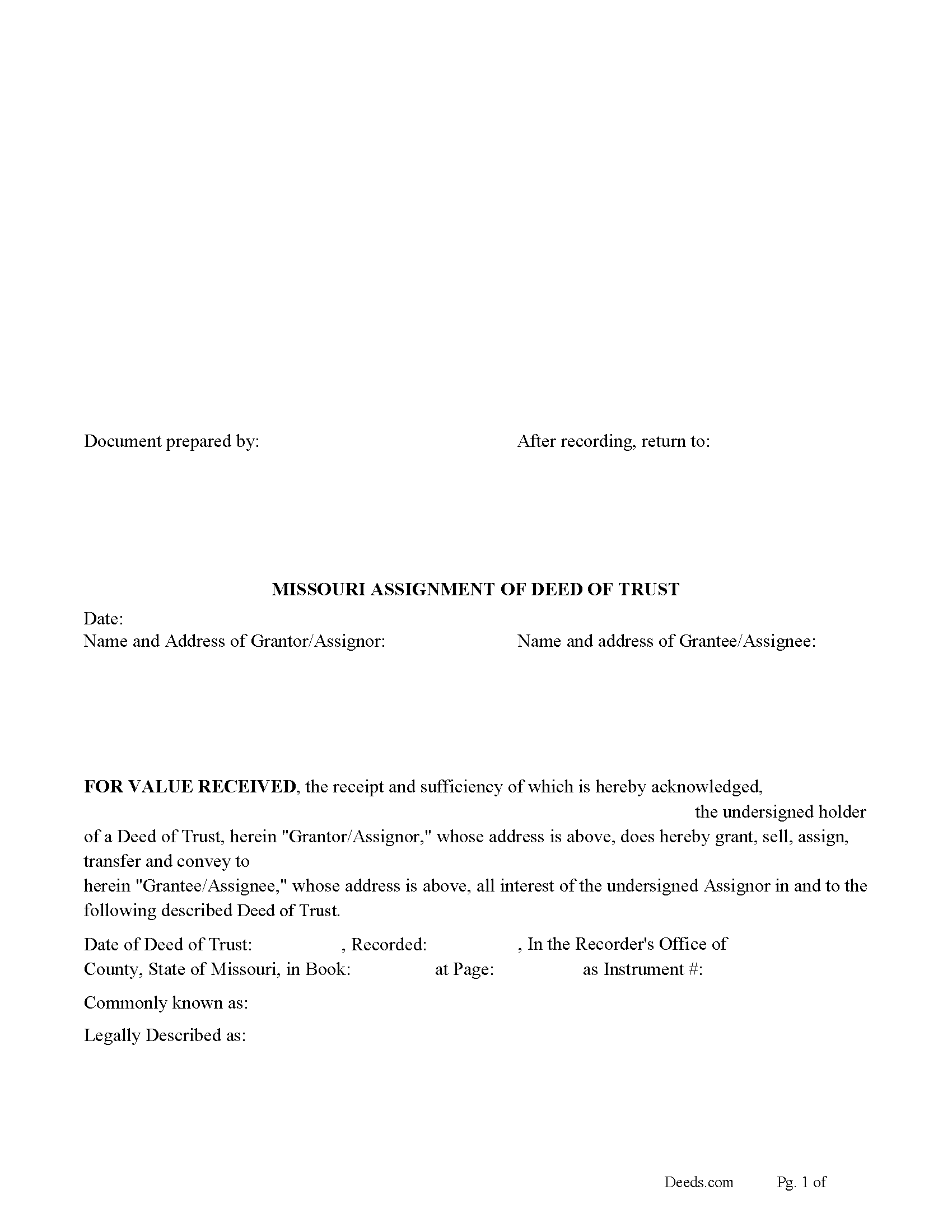
This form is used by the current holder to transfer/assign their interest in a Deed of Trust to another party. This is usually done when a Deed of Trust has been sold. An Assignment of Deed of Trust must have the grantor(s) and grantees listed on the first page (RSMo 59.310). An Assignment of Deed of Trust must have the legal description on the first page, as required by law (RSMo 59.330 & 59.310). If a document does NOT meet standardization requirements it will become non-standard and a $25.00 non-standard penalty will be charged, in addition to the normal recording fees. (RSMo 59.310)
Current Borrowers must be notified of the assignment. Notification consists of contact information of the new creditor, recording dates, recording instrument numbers, changes in loan, etc. Included are "Notice of Assignment of Deed of Trust" forms.
The Truth and lending act requires that borrowers be notified when their Deed of Trust has been sold, transferred, or assigned to a new creditor. Generally, within 30 days to avoid up to $2,000.00 in statutory damages, plus reasonable attorney's fees. Systematic violations can reach up $500,000.00.
(Missouri Assignment of DOT Package includes for... More Information about the Missouri Assignment of Deed of Trust
Full Deed of Release for Deed of Trust
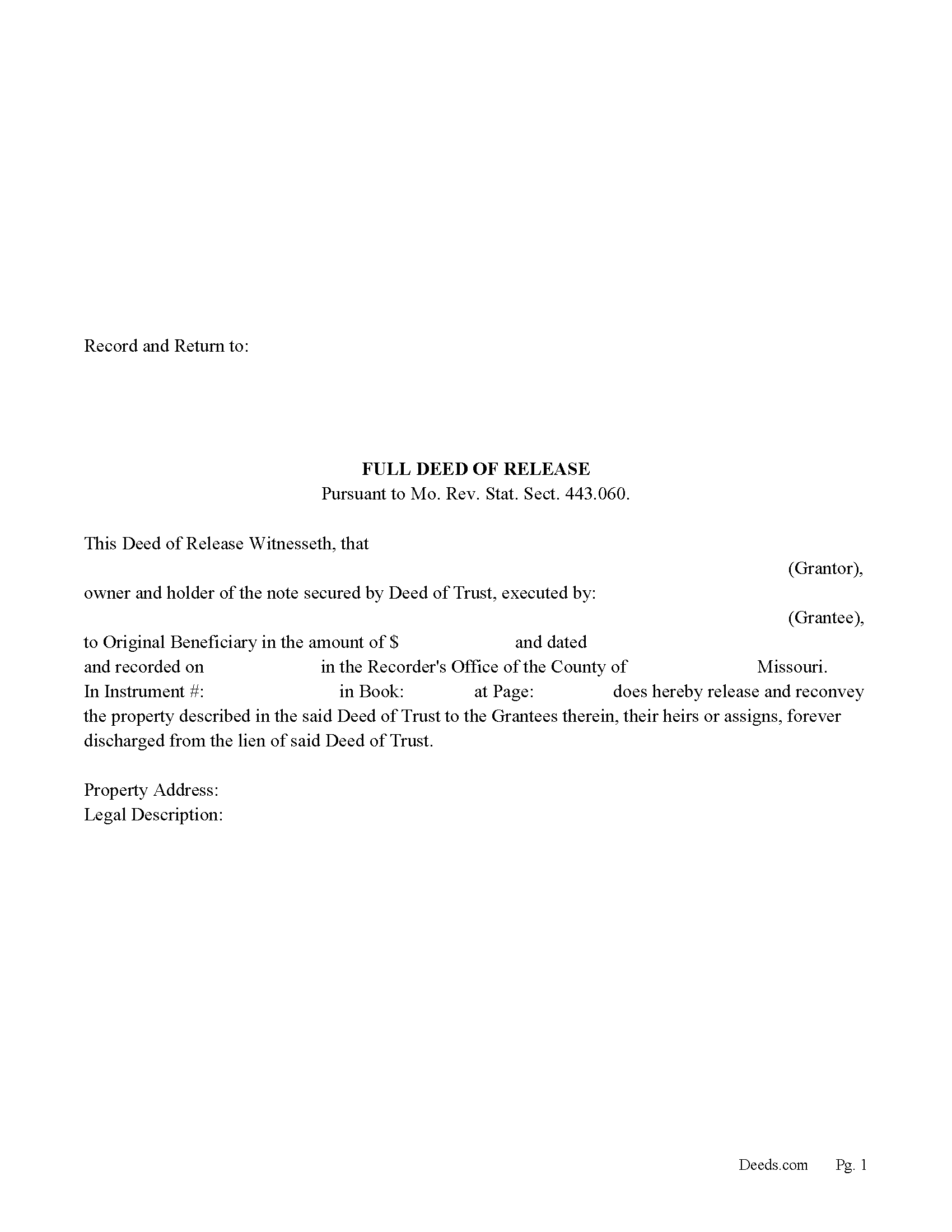
This form is used by the current Beneficiary/Lender or personal representative to release a Deed of Trust when it has been satisfied/paid in full, Pursuant to Mo. Rev. Stat. Sect. 443.060., which states that the Trustee shall NOT have to join in such Deed of Release.
In general the secured party has 45 days (30 days for a personal representative), after request to submit a Deed of Release to avoid penalty. [such secured party shall be liable to the mortgagor for the lesser of an amount of three hundred dollars a day for each day, after the forty-fifth day, that the secured party fails to submit for recording a sufficient deed of release or ten percent of the amount of the security instrument, plus court costs and attorney fees to be recovered in any court of competent jurisdiction. In the event a document submitted for recording by a secured party is rejected for recording for any reason, such secured party shall have sixty days following receipt of notice that the document has been rejected in which to submit a recordable and sufficient deed of release.] (443.170. Penalty for failing to acknowledge satisfaction and deliver deed of release) [443.130. Liability for failing to ... More Information about the Missouri Full Deed of Release for Deed of Trust
Mineral Deed
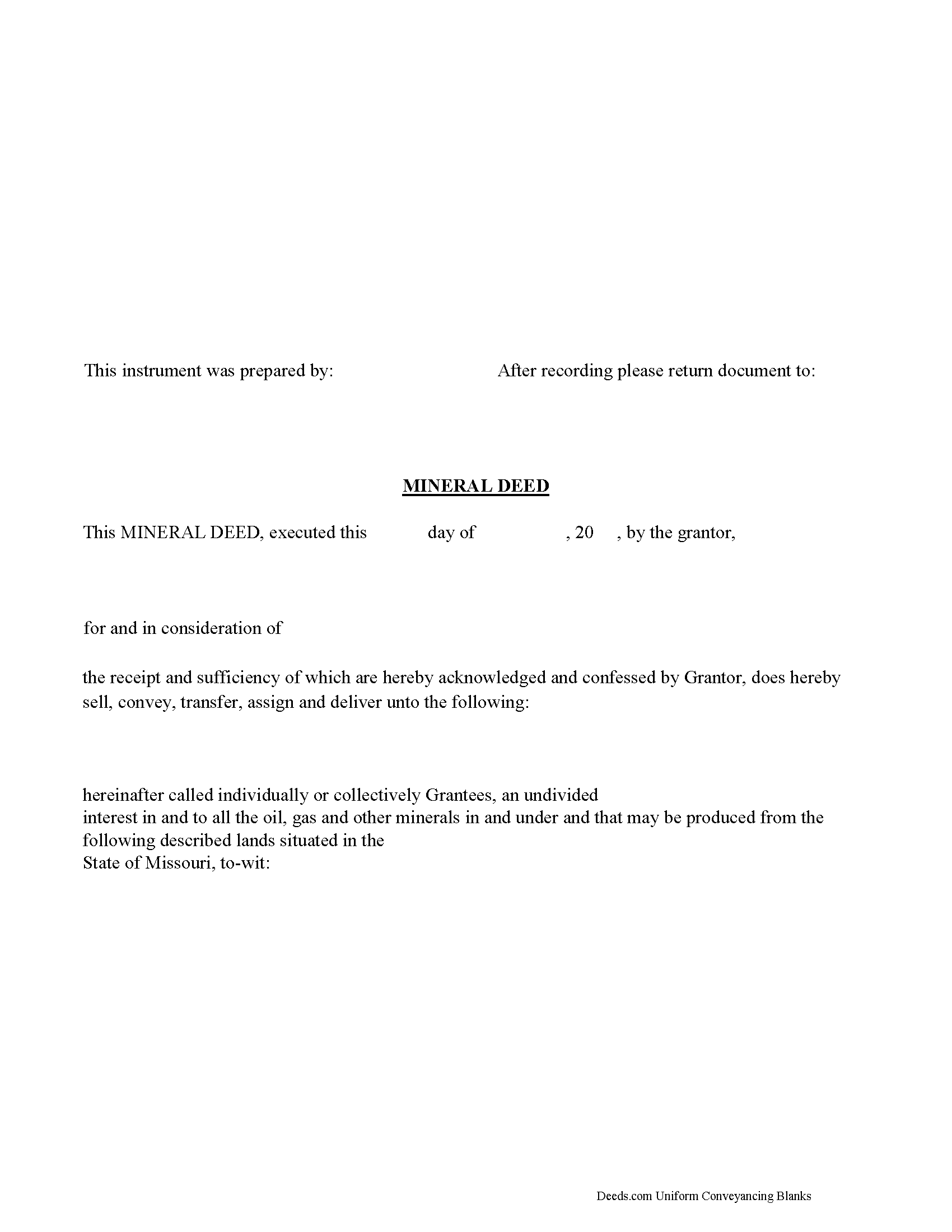
The General Mineral Deed in Missouri transfers oil, gas, and mineral rights from the grantor to the grantee. THIS IS NOT A LEASE. There are no Exceptions or Reservations included.
The transfer includes the oil, gas and other minerals of every kind and nature. It also transfers any and all rights to receive royalties, overriding royalties, net profits interests or other payments out of or with respect to those oil, gas and other minerals. The Grantor can stipulate the percentage of Mineral Rights the Grantee will receive and is made subject to any rights existing under any valid and subsisting oil and gas lease or leases of record.
This general mineral deed gives the grantee the right to access, for the purpose of mining, drilling, exploring, operating and developing said lands for oil, gas, and other minerals, and storing handling, transporting and marketing of such.
In this document the Grantor Warrants and will defend said Title to Grantee. Use of this document has a permanent effect on your rights to the property, if you are not completely sure of what you are executing seek the advice of a legal professional.
(Missouri MD Package includes form, guidelines, and compl... More Information about the Missouri Mineral Deed
Mineral Deed with Quitclaim Covenants
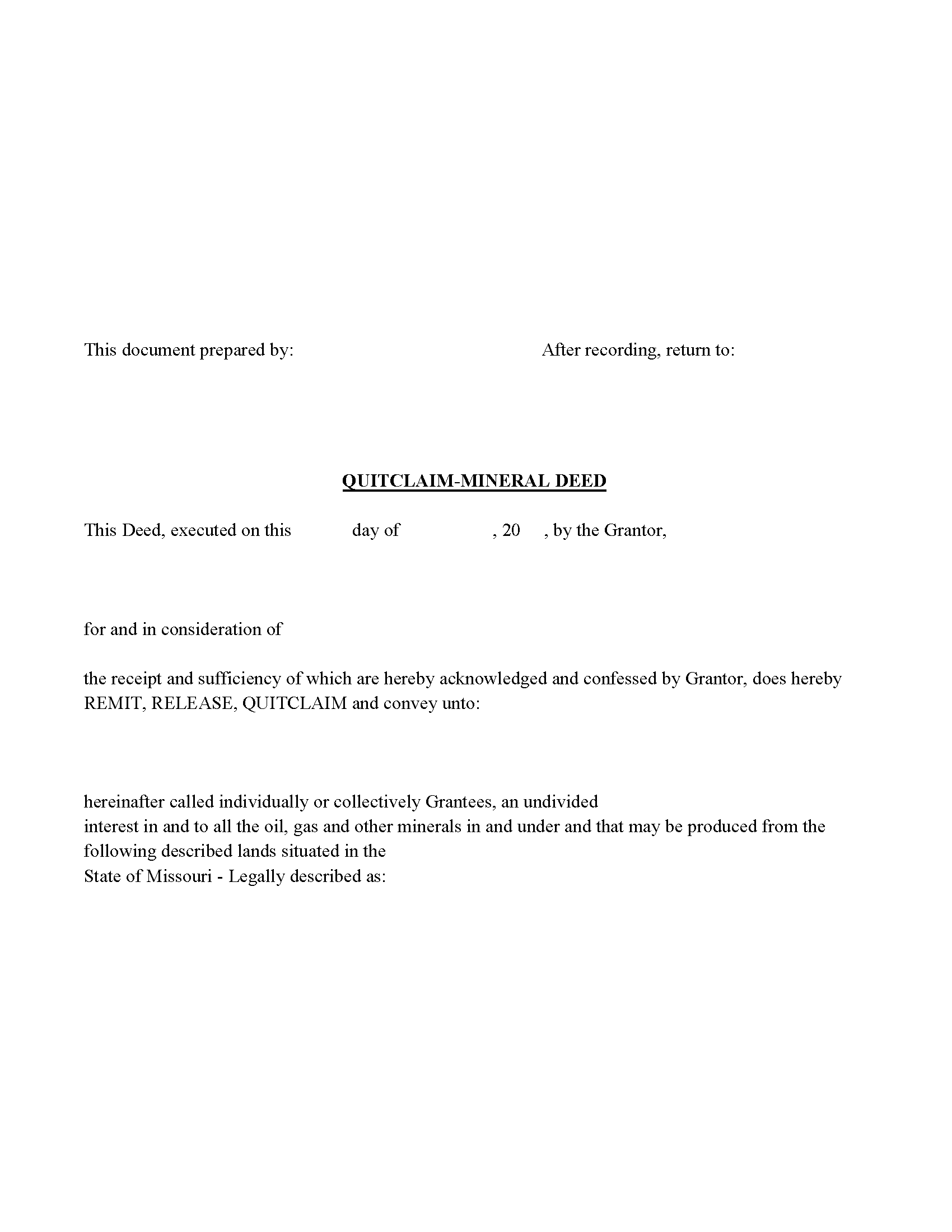
The General Mineral Deed in Missouri Quitclaims oil, gas, and mineral rights from the grantor to the grantee. THIS IS NOT A LEASE. There are no Exceptions or Reservations included.
The transfer includes the oil, gas and other minerals of every kind and nature. The Grantor can stipulate the percentage of Mineral Rights the Grantee will receive.
This general mineral deed gives the grantee the right to access, for the purpose of mining, drilling, exploring, operating and developing said lands for oil, gas, and other minerals, and storing handling, transporting and marketing of such.
The seller, or grantor Quitclaims the mineral rights and does NOT accept responsibility to any discrepancy of title (This assignment is without warranty of title, either express or implied)
Uses: Mineral deeds with quitclaim are often used in situations where the grantor wants to quickly release any interest they might have in mineral rights, such as in settling estates, resolving disputes, clearing up uncertainties about ownership in a title's history or when mineral rights have previously been severed or fragmented from surface rights and cloud a title, making it difficult to transfer propert... More Information about the Missouri Mineral Deed with Quitclaim Covenants
Disclaimer of Interest
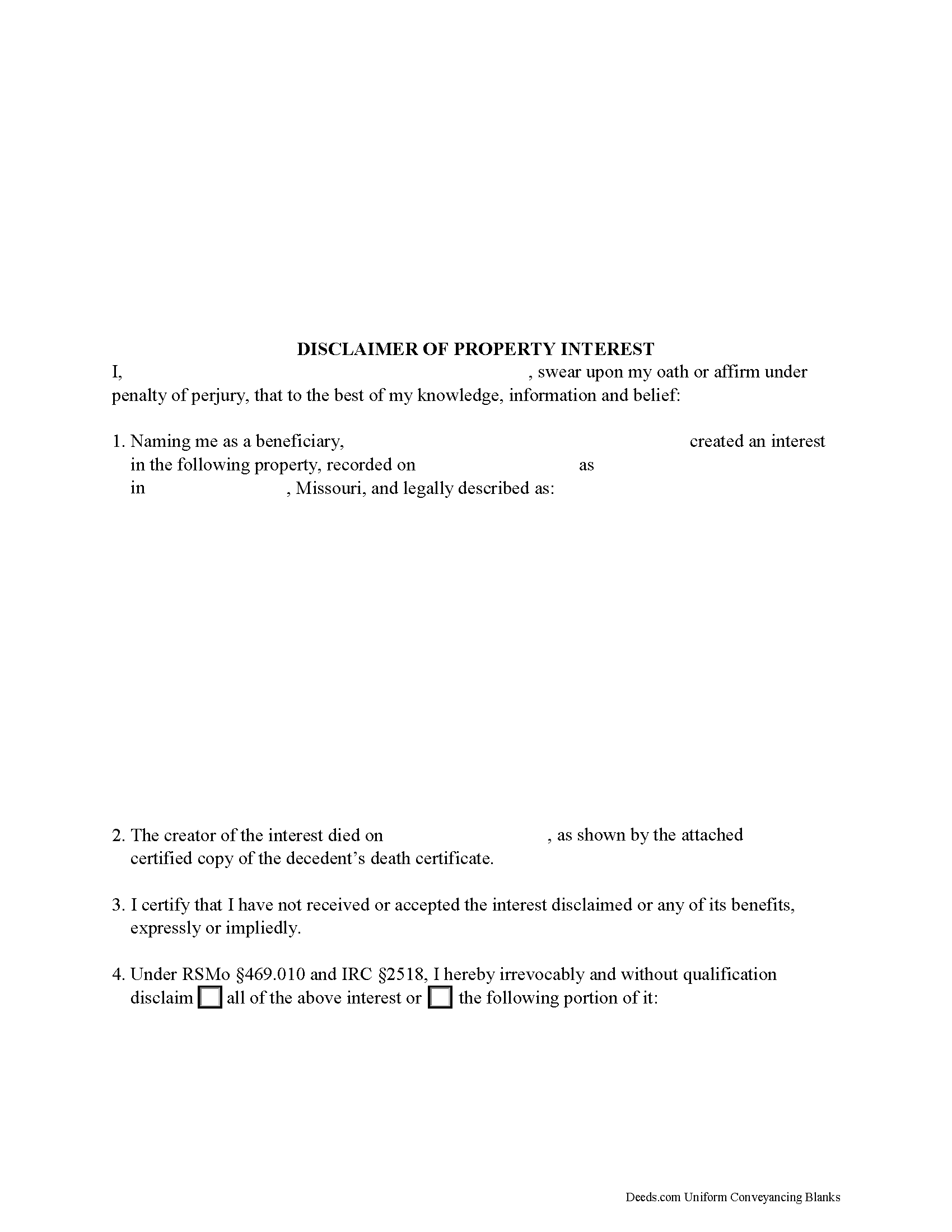
Under the Missouri Revised Statutes, the beneficiary of an interest in property may renounce the gift, either in part or in full (469.010). Note that the option to disclaim is only available to beneficiaries who have not acted in any way to indicate acceptance or ownership of the interest (469.020).
The disclaimer must be in writing and include a description of the interest, a declaration of intent to disclaim all or a defined portion of the interest, and be signed by the disclaimant.
Deliver the disclaimer within nine months of the transfer (e.g., the death of the creator of the interest) to the transferor or his representative or the holder of legal title (469.020). In the case of real property, acknowledge the disclaimer as is required for a deed and record it in the county where the property is located. In addition, deliver a copy of the disclaimer to the person or legal entity with current custody or possession of the property.
A disclaimer is irrevocable and binding for the disclaiming party and his or her creditors (469.010), so be sure to consult an attorney when in doubt about the drawbacks and benefits of disclaiming inherited property. If the disclaimed inter... More Information about the Missouri Disclaimer of Interest